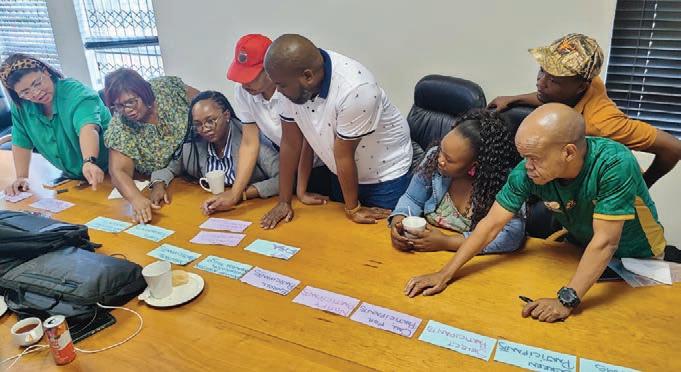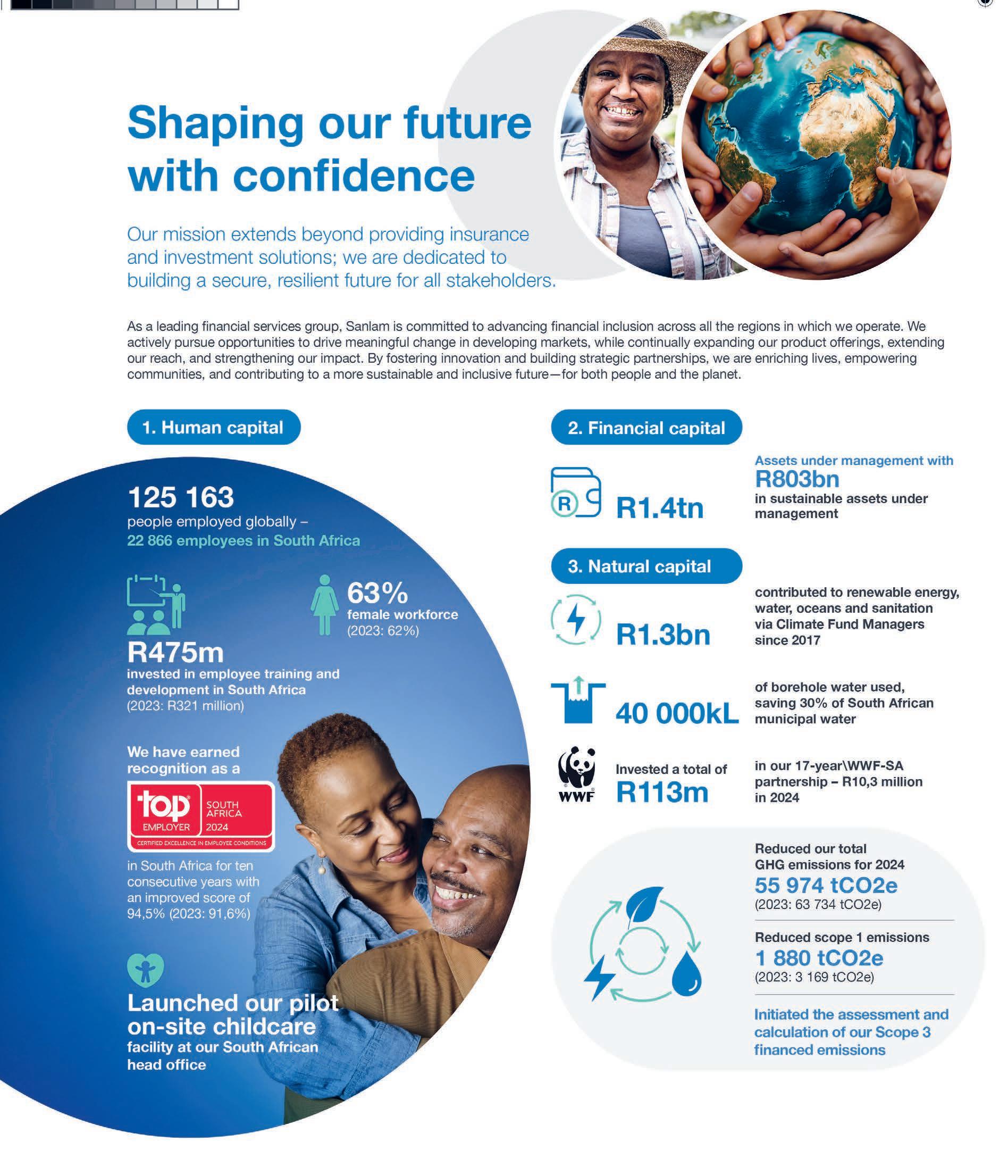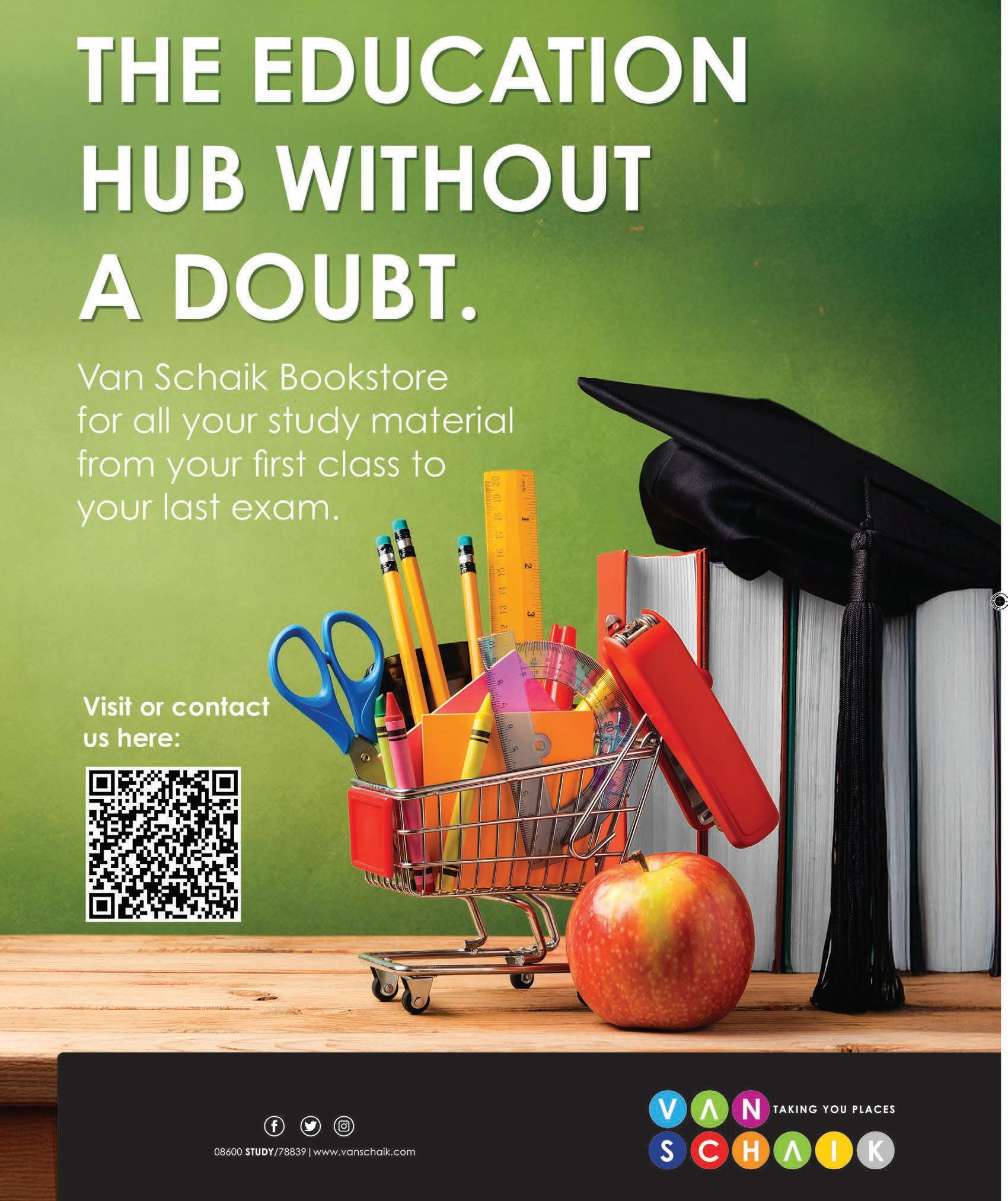








































































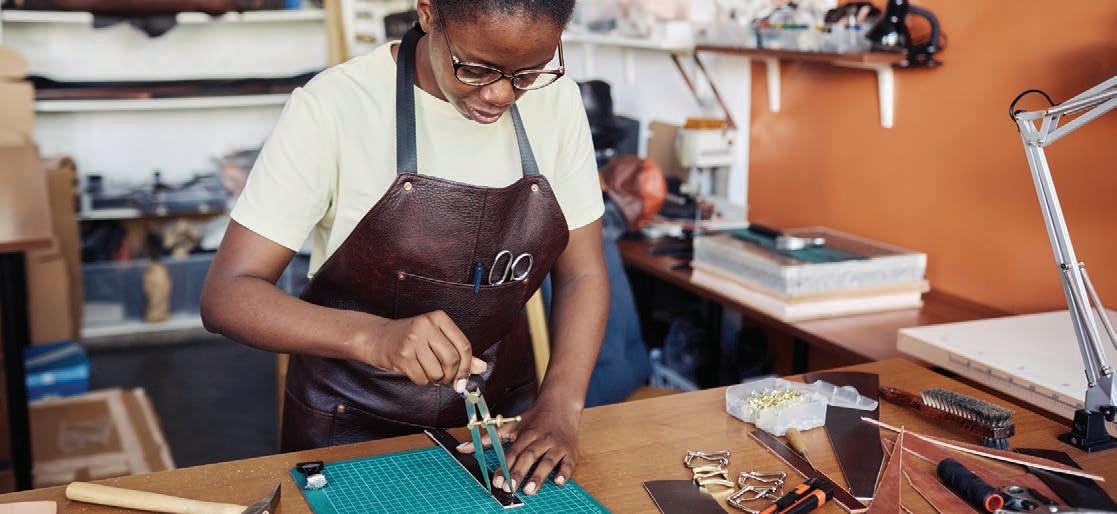
From green jobs and digital learning to an artisan revival, a new generation is stepping up






































































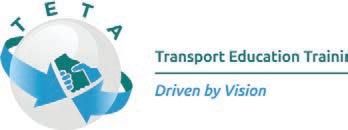








For many years, the South African skills development landscape has been shaped by deep-rooted inequality and access to quality education and training opportunities. These historic challenges have contributed to slow economic growth, high unemployment rates and the shortage of critical skills.
In support of national e orts to address the widening skills gap, Toyota South Africa Motors (TSAM) is committed to driving sustainable, high-impact activities that respond to real social needs. Through these e orts, TSAM reinforces its strategic intent to bring happiness for all whilst supporting inclusive and sustainable growth in society, thus leaving no one behind.
For greater impact, TSAM believes in the power of collaboration and partnerships to achieve sustainable community upliftment. Through collaborative support of two not-for-pro t educational trusts, Toyota Teach and the Toyota Wessels Institute for Manufacturing Studies (TWIMS), TSAM aims to create a better future for everyone.
Under the auspices of the Toyota South Africa Foundation, the Toyota Teach Primary School Project provides capacity building to primary school educators through quality mentorship and coaching to improve teaching and learning. The Project’s core focus areas are Grade Rlearning through play; Languages - reading for meaning; Mathematics Computation; Science and Technology activities; School leadership
team capacitation and parental involvement in their children’s learning. The project intervention is formulated to improve fundamental skills and teaching strategies to optimise time for teaching and learning - a strategy that contributes to the cognitive development of learners.

Since its establishment 35 years ago, the Toyota Teach Primary School Project has made a signi cant di erence in the lives of bene ciaries based within close proximity of the Toyota Manufacturing Plant in Prospecton, Durban: 188 schools, 783 teachers and 28 738 learners.
Through Toyota Teach, Toyota South Africa Motors is equipping teachers for change.
For more information on the Toyota Teach Primary School Project, visit www.toyotateach.co.za.
The role over product for innovation Established for this manufacturing development. Through TWIMS capabilities in drive industrialisation, manufacturing generation In of specialised understanding
The manufacturing sector plays a signi cant role in the South African economy, contributing over 10% towards the country’s gross domestic product (GDP). This impresses on the need for increased advancements in leadership and innovation within the manufacturing environment. Established in 2018, the Toyota Wessels Institute for Manufacturing Studies (TWIMS) exists to close this gap. TWIMS serves as a hub for advanced manufacturing education, research and executive development.
Through its learning and development o erings, TWIMS aims to bolster Africa’s industrial capabilities by fostering strategic thinking in manufacturing. The institute’s vision is to drive sustainable economic growth through industrialisation, addressing the need for skilled manufacturing professionals and to cultivate a new generation of manufacturing leaders across Africa.
In collaboration with the Gordon Institute of Business Science (GIBS), TWIMS o ers a specialised MBA - a program designed to deepen understanding of business fundamentals within
the manufacturing context. The manufacturing electives, presented by TWIMS, emphasise the future of manufacturing, lean management, green manufacturing, leading gender transformation in manufacturing, industrial and trade policy for industrialisation in Africa, equipping leaders with the tools to navigate the complexities of modern manufacturing.
With its targeted focus, the MBA equips students with the necessary skills to excel in this eld and prepares them to be leaders capable of driving change and innovation.
For more information about TWIMS and its o erings, visit www.twimsafrica.com.
As a major role player within the manufacturing sector, TSAM’s interventions underscore the importance of working towards an inclusive and sustainable growth of society. Through these initiatives, TSAM continues to invest in South Africa’s future - empowering individuals, strengthening communities and contributing to a more skilled and resilient workforce.
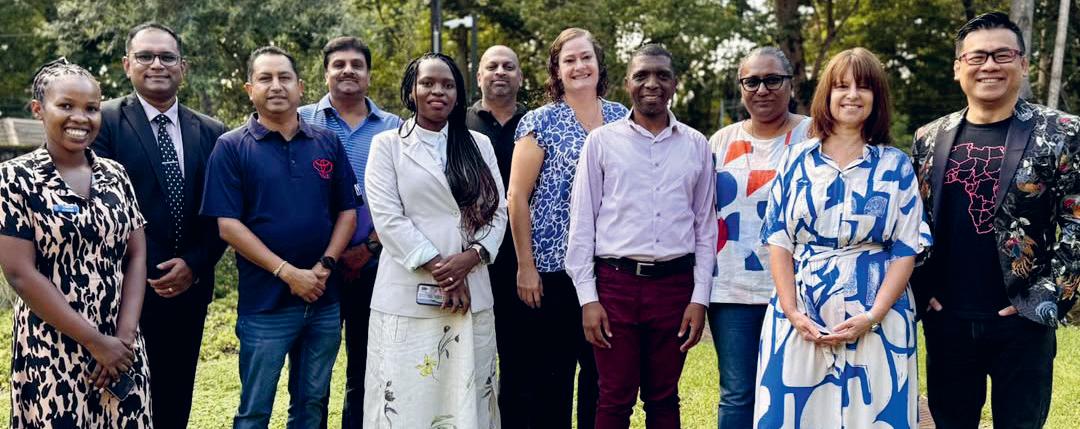

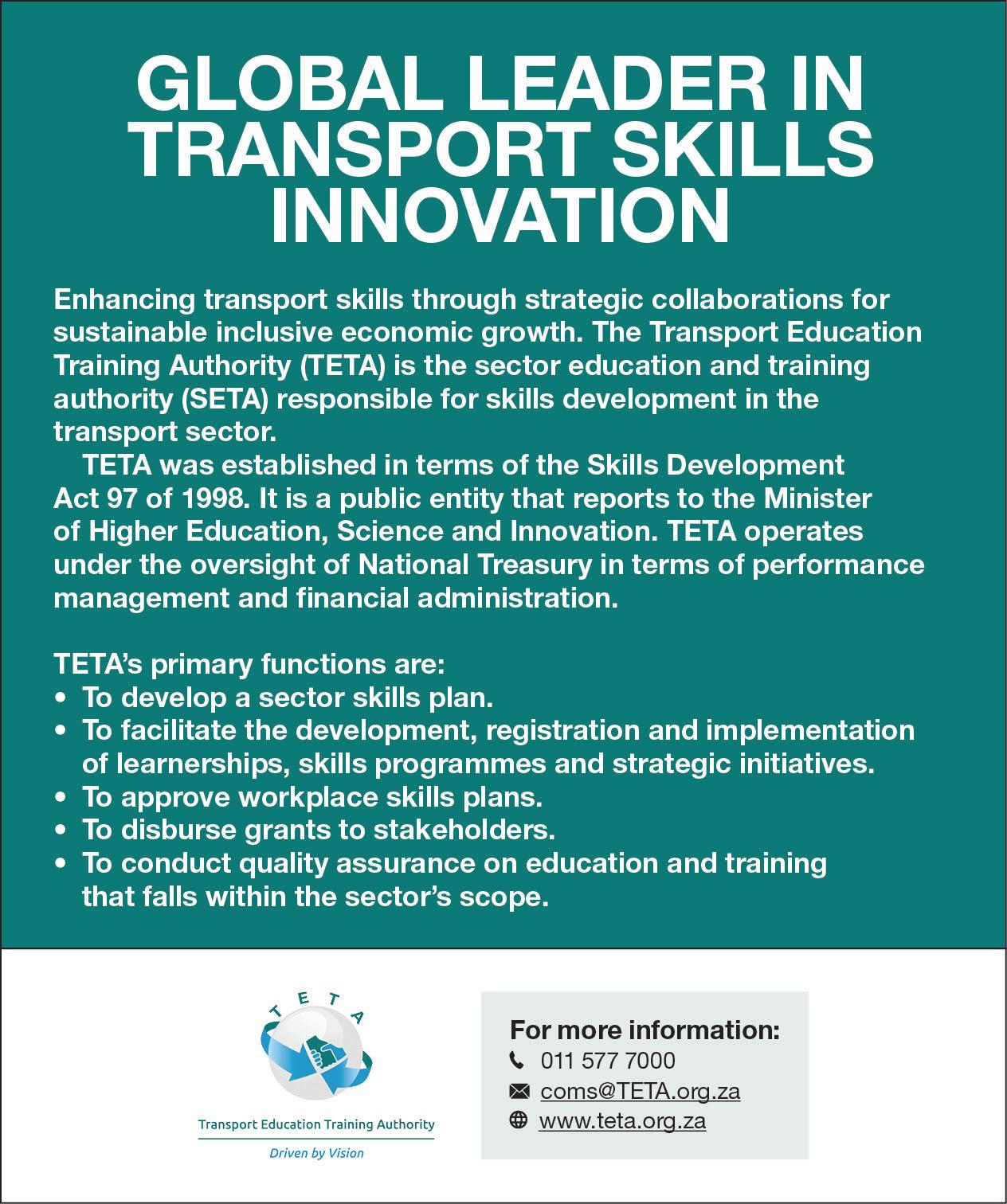

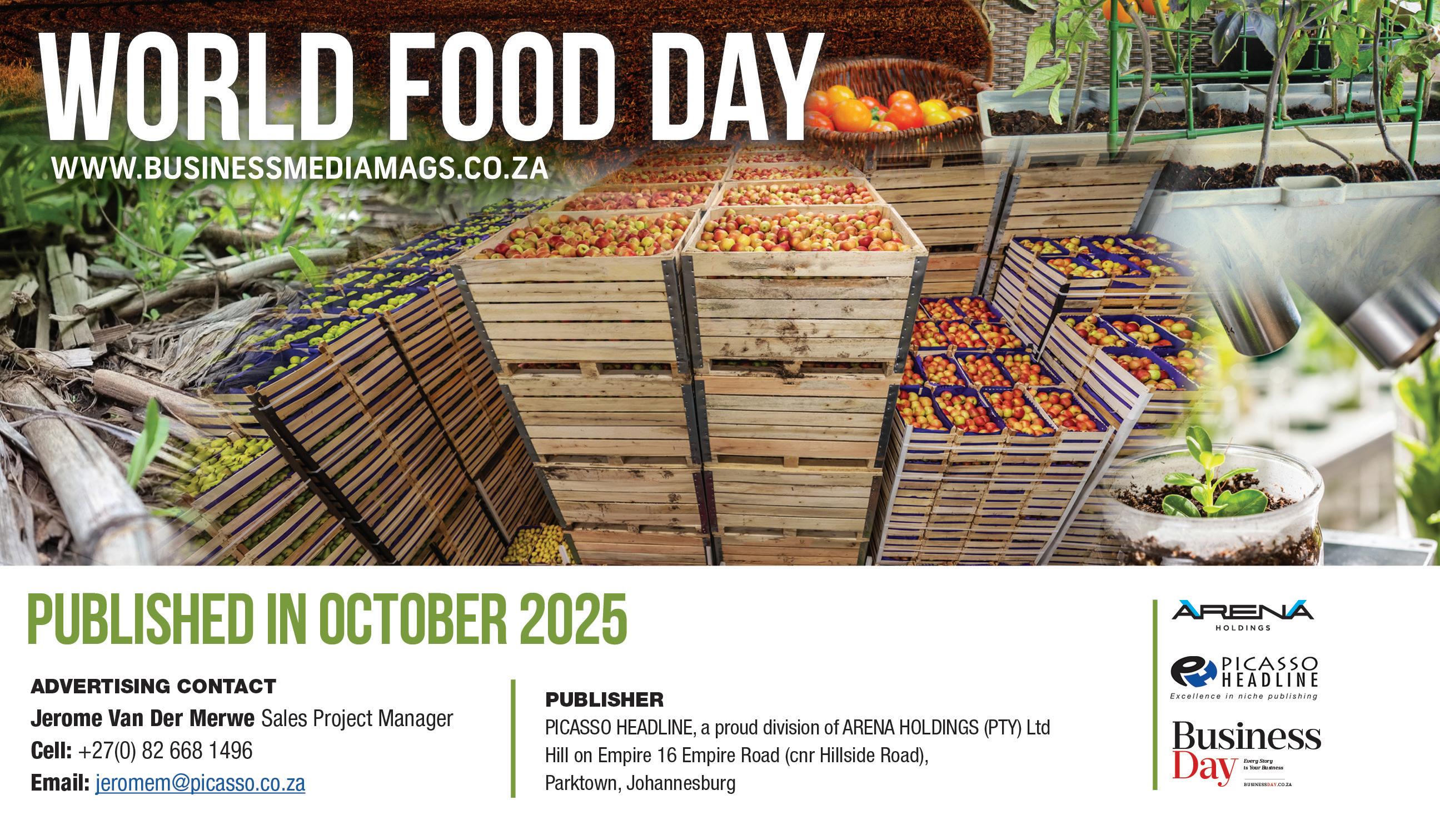
Picasso Headline,
A proud division of Arena Holdings (Pty) Ltd, Hill on Empire, 16 Empire Road (cnr Hillside Road), Parktown, Johannesburg, 2193 PO Box 12500, Mill Street, Cape Town, 8010 www.businessmediamags.co.za
EDITORIAL
Editor: Ryland Fisher
Content Manager: Raina Julies rainaj@picasso.co.za
Contributors: Trevor Crighton, Marchelle Abrahams, Lesego Gaegane, Itumeleng Mogaki, Busani Moyo, Brendon Petersen, Rianné Potgieter, Anthony Sharpe, Viren Sookhun
Copy Editor: Lisa Witepski
Content Co-ordinator: Natasha Maneveldt
Online Editor: Stacey Visser vissers@businessmediamags.co.za
DESIGN
Head of Design: Jayne Macé-Ferguson
Senior Designer: Mfundo Archie Ndzo
Project Designer: Annie Fraser
Cover Images: f8studi/www.123RF.com, seventyfour74/www.123RF.com, yacobchuk/www.123RF.com, peopleimages12/www.123RF.com
SALES
Project Manager: Jerome van der Merwe jeromem@picasso.co.za
Tel: +27 21 469 2484 | 082 668 1496
Sales: Frank Simons
PRODUCTION
Production Editor: Shamiela Brenner
Advertising Co-ordinator: Johan Labuschagne
Subscriptions and Distribution: Fatima Dramat fatimad@picasso.co.za
Printer: CTP Printers, Cape Town
MANAGEMENT
Management Accountant: Deidre Musha
Business Manager: Lodewyk van der Walt General Manager, Magazines: Jocelyne Bayer
In a fast-changing world, it is often dif cult for the formal education system to keep up with the needs of society. The skills that are sorely needed today are not necessarily the same as those which were required ten or even ve years ago.
Technology is streaking ahead of the rest of society and, if we do not keep up, we run the risk of having, in the near future, an educated but unskilled population.
In this edition of Skills Development, our focus is on how we can keep up with technological changes and how we can prepare our youth to face the future with con dence.
Among many others issues, we look at how government, through the TVET colleges, universities and SETAs, is having to reimagine its role, and how the private sector, through some innovative projects, is trying to ll the gaps. We look at how young people are upskilling each other in South African townships, giving life to the old student slogan, Each One, Teach One. We also look at the rise of technology learning and teaching in townships.
More and more, skills are being needed in South Africa’s green economy and we ask whether enough is being done to prepare young people for the future of climate resilience. We also look at how entrepreneurs are grabbing the opportunities presented by new technologies to impact positively on society. But it is not only about preparing young people for the digital age; it is also about preparing some of them for tried-and-tested artisanal jobs, the kinds that have been around for ages and which will be around for ages, such as plumbing, welding and mechanics.
Ryland Fisher EDITOR
COPYRIGHT: Picasso Headline. No portion of this magazine may be reproduced in any form without written consent of the publisher. The publisher is not responsible for unsolicited material. SKILLS is published by Picasso Headline. The opinions expressed are not necessarily those of Picasso Headline. All advertisements/advertorials have been paid for and therefore do not carry any endorsement by the publisher.
5 TRAINING FUTURE-READY
If TVET colleges can align their curricula with 4IR skills, they can play an important role in preparing students for a rapidly evolving digital landscape.
12 LEARNING GREEN
Green skills are essential for saving the planet, but also for providing jobs.
13 YOUTH-LED LEARNING
Peer-to-peer learning is transforming SA’s townships and unlocking career opportunities.
16 THE ARTISAN REVIVAL
Skilled artisans have the potential to solve South Africa’s unemployment challenge.
17 DIGITAL INCLUSION
A new wave of digital creators are building hyperlocal tech solutions shaped by language, logistics and lived experience.
21 COMPLIANCE
True compliance is less about ticking the boxes of regulation and corporate governance and more applying the values we learn early on.
24 INNOVATION
Women founders drive impactful change in their chosen industries.
25 EDTECH
South African edtech innovations make learning contextual, inclusive and gami ed.
26 ENTREPRENUERSHIP
Technology is transforming the lives and livelihoods of all South Africans, including the millions who call our townships home.
28 DIGITAL ECONOMY
SA's real barrier to progress is whether technology can meet people where they are.
33 ENERGY
The renewable energy sector is booming –but without young talent, its growth will stall.
34 INFRASTRUCTURE
As climate impacts intensify, South Africa’s crumbling infrastructure reveals a deeper crisis: a skills gap that undermines resilience, sustainability and long-term service delivery.

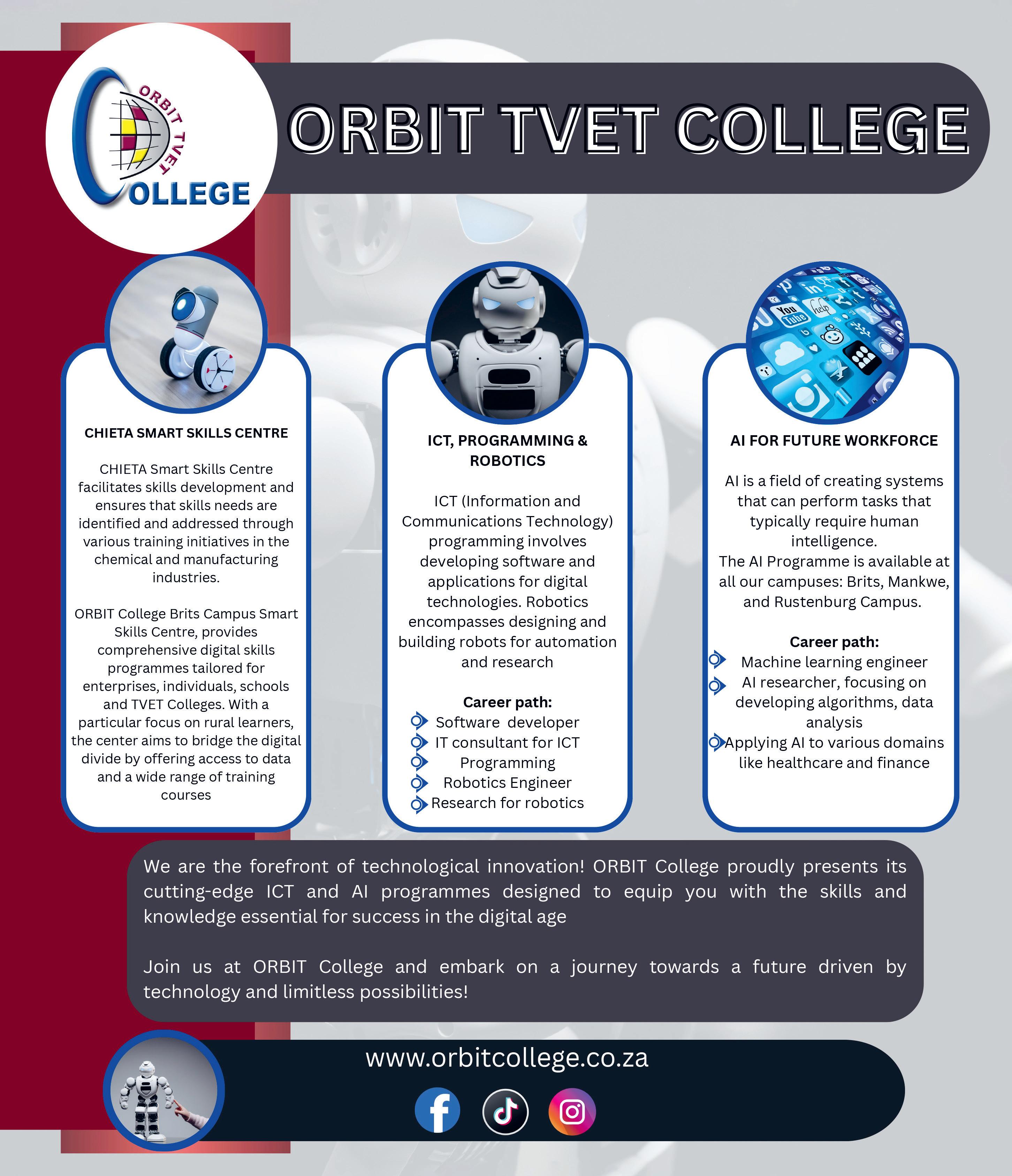
If TVET colleges can align their curricula with 4IR skills, they can play an important role in preparing students for a rapidly evolving digital landscape, writes BUSANI MOYO
Both government and technical and vocational education and training (TVET) colleges in South Africa recognise the importance of keeping up with the evolving technological landscape as anchored by fourth industrial revolution (4IR). For instance, in May 2024, the then minister of Higher Education, Blade Nzimande, launched the 4IR Centres of Excellence at TVET colleges at the Council for Scienti c and Industrial Research (CSIR) in Pretoria. The launch culminated from a collaboration between the Department of Higher Education and a select group of sector education authorities (SETAs) seeking to transform the curriculum to respond to the needs of a world that is being rapidly changed by 4IR.

certainly very aware of these issues. With regard to artisanal demand, this has been a policy focus for many years now.
“Certainly, the colleges are on board with it, and, in particular, those colleges designated as centres of specialisation have been building stronger programmes.”
Allais also notes: “In terms of digitalisation and sustainability, colleges in general are aware of the issues. Many of them have been grappling with how best to address them and what it means for the courses they offer and giving young people a start in a job that requires these skills.”
She says because these colleges have varying institutional capacity, there are also substantial variances in their responses to these issues.
“IN TERMS OF DIGITALISATION AND SUSTAINABILITY, COLLEGES IN GENERAL ARE AWARE OF THE ISSUES, AND MANY OF THEM HAVE BEEN GRAPPLING WITH HOW BEST TO ADDRESS THEM.”
Professor Stephanie Allais is the research chair of the Skills Development Centre for Researching Education and Labour at the University of the Witwatersrand. In reference to recognising the need to align curricula with 4IR skills, sustainability goals and artisanal demand, she says: “The colleges, especially the better ones, are
Charlene Matthews, acting principal of False Bay TVET College, agrees that TVET colleges understand the
importance of producing not just workers, but also entrepreneurs who can thrive in the 4IR environment. “Entrepreneurial development is considered critical for providing youth with fundamental 21st-century skills. Key focus sectors include ICT, digital technology, AI, virtual reality, innovation, artisan and trade skills, engineering, hospitality and tourism, and renewable energy.
“False Bay College has made entrepreneurship a strategic imperative, integrating it into its mandate and mission. It houses an established Centre for Entrepreneurship and rapid incubator as a self-funded unit within its Innovation and Development Department.
“The centre collaborates with ecosystem partners to deliver demand-based entrepreneurial programmes.”
Matthews adds that the college is working hard to ensure it remains relevant within the rapidly changing environment inspired by 4IR. “The college’s goal is to stimulate and support entrepreneurial development to empower students with skills for work and business, offering entrepreneurship as an alternative career path.
“The centre provides diverse programmes and projects for individuals at various stages, including aspiring, promising, start-up, existing and growth-phase entrepreneurs and small, medium and micro enterprises (SMMEs). These programmes are available to students, township youth, entrepreneurs and SMMEs seeking knowledge, development, mentoring and coaching,” she says.
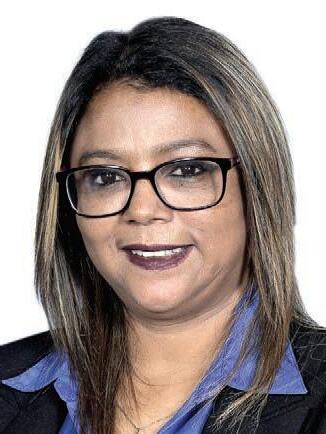
Charlene Matthews
Follow: Stephanie Allais @ www.linkedin.com/in/stephanie-allais-1280a9b0 Charlene Matthews @ www.linkedin.com/in/charlene-matthews-4a978413
While False Bay College’s example shows these institutions know that they need to transform and create not just employees, but also entrepreneurs with the skills required to succeed in 4IR, Allais says more needs to be done. “There are some interventions that attempt to provide more integrated support, including business start-up support.”
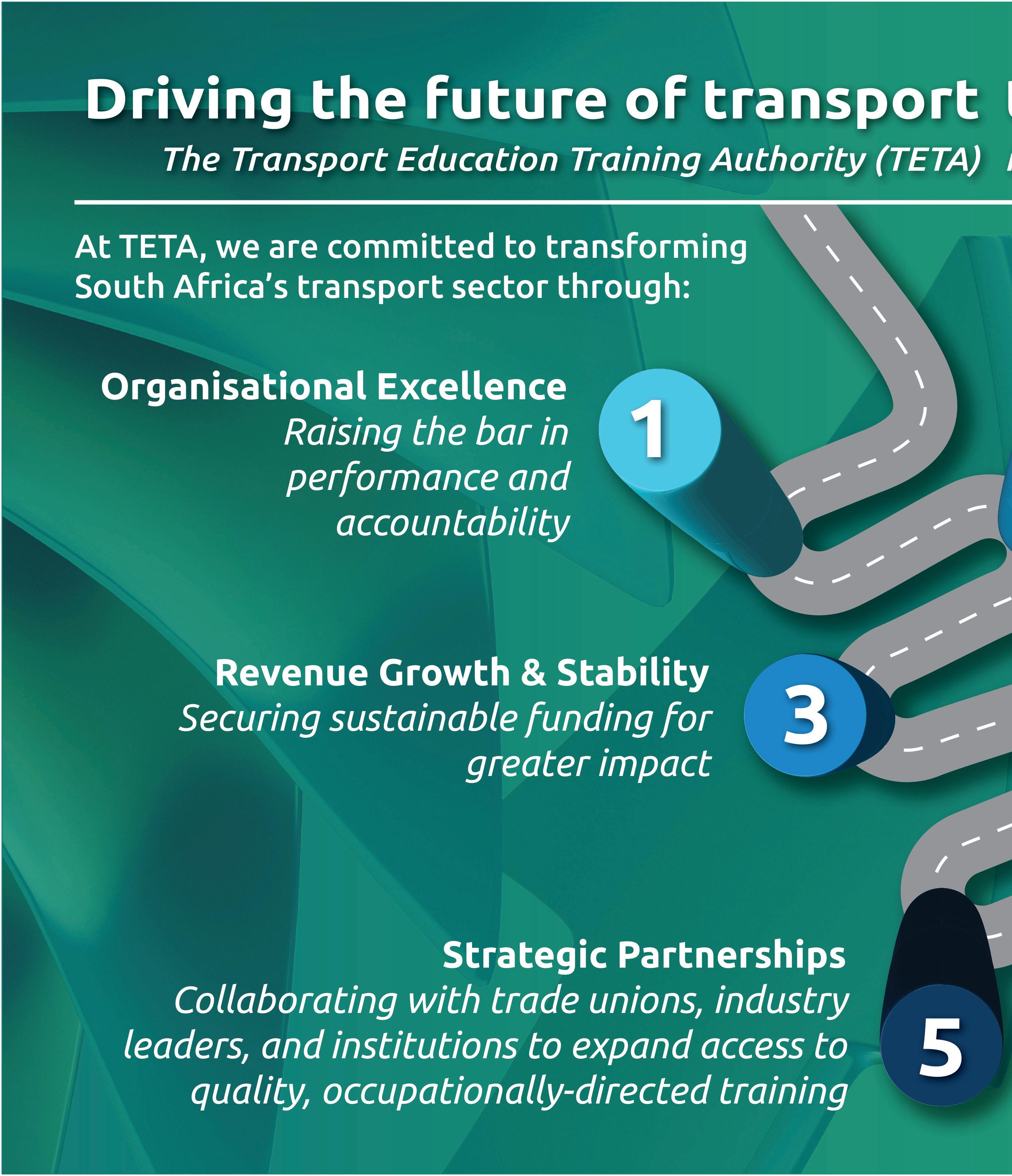
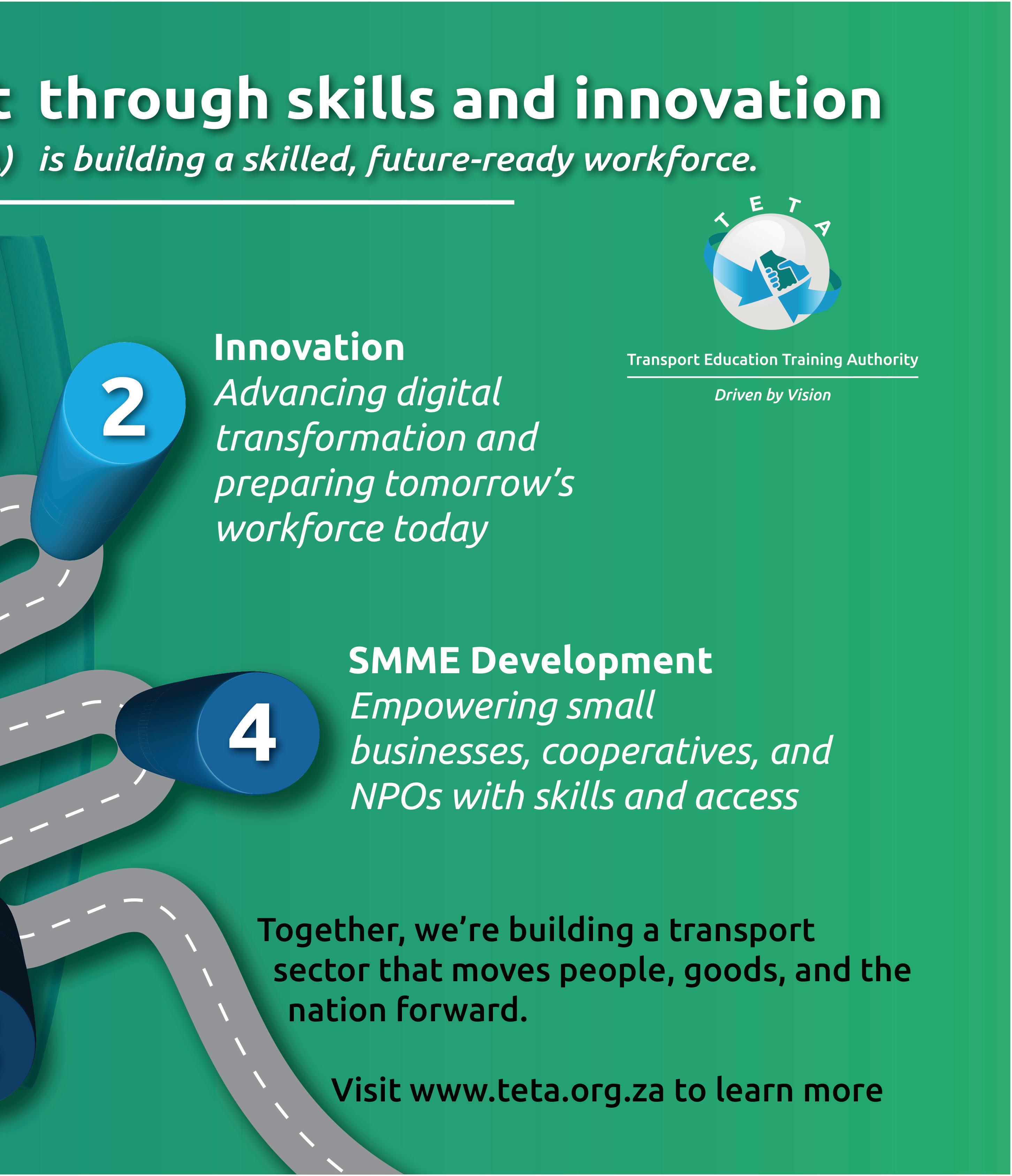

Through bold partnerships and grassroots training, THE TRANSPORT EDUCATION AND TRAINING AUTHORITY is driving the taxi industry towards safety, structure and growth
In the bustling world of South African public transport, the taxi industry is the undisputed backbone – informal, fast-paced and deeply woven into the nation’s socioeconomic fabric. Thanks to the Transport Education and Training Authority (TETA) and its Taxi Chamber, the industry is undergoing a bold transformation aimed at making it safer, smarter and more sustainable.
Ramodise Tsolo, executive of cer of TETA’s Taxi Chamber, who has become a vocal advocate for change in a sector often overlooked in formal economic conversations, says: “We’re not just driving people; we’re driving transformation. That requires more than just fuel. It needs strategy, skills development and partnerships.”
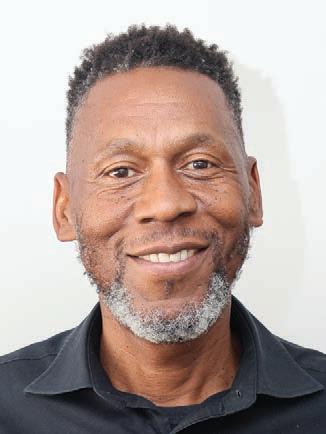
TETA’s Taxi Chamber is changing this narrative by actively promoting the formalisation of the industry. Through Memoranda of Understanding (MoUs) with major umbrella bodies, such as the South African National Taxi Council (SANTACO) and the National Taxi Alliance (NTA), the chamber is ensuring transformation is not just an idea, but rather an operational reality.
“These agreements are more than symbolic. They are vehicles for change, putting mechanisms in place to drive professionalisation and better regulation,” he adds.
also includes addressing the skills shortage in the broader transport workforce,” says Tsolo.
Through a nationwide effort, the authority works with small, medium and micro enterprises (SMMEs) and large operators to identify training needs, collect industry-speci c data and design responsive education programmes.
From basic adult education to workplace experiential learning, apprenticeships and SMME development, TETA offers a comprehensive suite of initiatives.
“These programmes are not limited to big players. TETA actively ensures that grassroots operators, including co-operatives, NGOs and small taxi associations, can access support, provided they meet basic regulatory requirements,” Tsolo explains. “This democratises opportunity and ensures transformation reaches those most in need.”
The organisation also funds bursaries for students to study at public CET/TVET colleges, universities and all other institutions of higher learning. “We also partner with local governments, training providers and even of ces of the premiers to roll out community-level skills initiatives,” adds Tsolo.
By supporting individuals and organisations, TETA is laying the foundation for a transport system that is not only ef cient, but also inclusive.
With the sector still facing pressure from e-hailing services and shifting commuter habits, the road ahead for the taxi industry won’t be without potholes. However, with leaders like Tsolo and the Taxi Chamber at the wheel, there is growing optimism that the industry can evolve, retaining its relevance while raising its standards.
One of the most forward-thinking initiatives under TETA’s belt is the three-year express parcel delivery pilot project, which explores new income streams for taxi operators beyond passenger transport. However, says Tsolo, this is just the beginning. The authority is tackling everything from road safety and operator upskilling to deeper socioeconomic concerns, such as poverty and youth unemployment.
Tsolo adds: “Historically, the minibus taxi sector has operated in a grey area, vital to daily commuting, but often marred by informality, inadequate safety standards and occasional violence.”
He continues: “Through these partnerships, operators are gaining access to accredited training, business development support and structured engagement with government and the private sector.”
Road safety remains a pressing concern in the taxi industry, particularly during peak traf c periods and holiday seasons. “TETA is tackling this head on through national campaigns aimed at driver education and behaviour change,” adds Tsolo.
SANTACO’s “Hlokomela” campaign and the NTA’s “Ndlelanhle Festive Season and Customer Care Campaign” are both supported by TETA, emphasising responsible driving, customer service and law enforcement co-operation.
“Safety and professionalism go hand in hand. You can’t have one without the other. Our mission
“The taxi industry is one of South Africa’s biggest untapped assets. Our job is to unlock its full potential for operators, commuters and the economy at large.
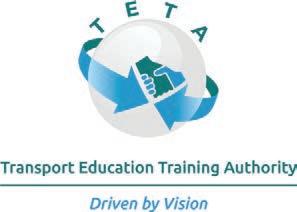
For more information: 011 577 7000 info@teta.org.za www.teta.org.za
Driving youth empowerment, gender inclusion and rural development through bold leadership in the transport sector. By
In an economy where skills development is not just a necessity, but a lifeline, the Transport Education and Training Authority (TETA) is becoming a transformative force.
At the heart of this mission is CEO Maphefo Anno-Frempong, a dynamic leader who believes that meaningful progress lies in empowering youth, uplifting rural communities and opening the transport sector to women.
She unpacks TETA’s involvement in the District Development Model (DDM), youth-centred innovations and the steps taken to reshape leadership in transport.
TETA’s engagement with the DDM is both strategic and grassroots. “Through the EmpowaYouth programmes, we’ve reached over 100 000 young people through digital and in-person platforms. We’re creating access to industries many young people never thought they could enter,” Anno-Frempong explains.
Some of TETA’s agship initiatives under the DDM include the Economic Stimulus Programme (ESP) and the Economic Reconstruction and Recovery Plan (ERRP).
These programmes focus on backyard mechanics, e-commerce, entrepreneurship and motorbike-based delivery services. They provide unemployed youth with training, licences and business registration support.
“Our Last-Mile Delivery initiative has turned young job seekers into business owners,” Anno-Frempong adds proudly.
One of the major criticisms often levied at development initiatives is their lack of relevance to local needs. TETA, however, has worked hard to defy that pattern.
Says Anno-Frempong: “Our rural training centres, mobile classrooms and digital access programmes ensure people in underdeveloped areas are not left behind. Part of this localisation
includes partnerships with local co-operatives, internships and facilitating direct employment and entrepreneurial opportunities. We’ve created structured pathways to take youth from learning into employment or enterprise.”
For Anno-Frempong, youth empowerment isn’t a corporate slogan; it’s a working strategy. “Young people are the drivers of change. We target unemployed youth where they are, especially in rural areas, rather than asking them to move in search of opportunity,” she says.
Through the New Venture Creation Programme, young entrepreneurs are taught how to start and manage businesses. The Youth-Empowa-Weekends bring together business leaders and aspiring youth to facilitate real-time mentorship, business funding insights and collaboration.
“Over one hundred and twenty-nine thousand young people have been exposed to business opportunities across nine provinces. Today, six hundred and one of them are in active employment and three thousand six hundred are in entrepreneur training,” adds Anno-Frempong.
TETA also supports education through its adoption of 60 no-fee rural schools countrywide. The schools receive teacher support, digital tools and ongoing career guidance to plant seeds of ambition in learners from Grade 9 to Grade 12.
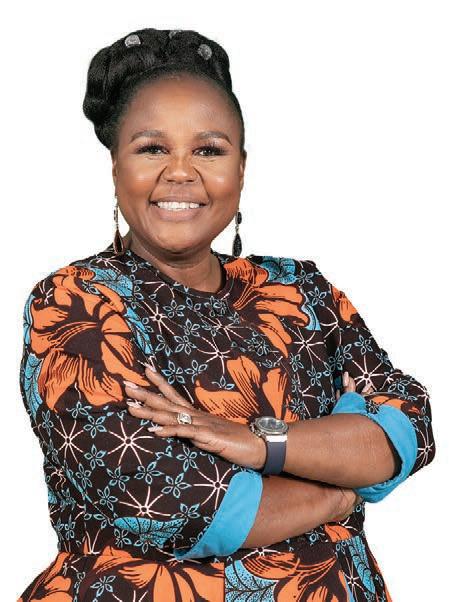
Anno-Frempong is passionate about women’s advancement in the transport sector. “Our EmpowaWomen summits bring women together to learn, network and access tools that will help them lead in logistics, aviation and rail,” she says.
TETA’s investments go beyond events, funding the training of women pilots, truck drivers and executive managers. Programmes like the International Executive Development Programme for Women have impacted dozens of professionals, offering
exposure to global best practices and fostering local leadership capacity. “We are creating champions for the transport sector, women who can manage complexity and lead innovation,” Anno-Frempong explains.
Although barriers such as cultural biases, limited funding and structural safety issues still exist, she says TETA is working hard to dismantle them.
TETA’s leadership programmes, many run in collaboration with institutions such as GIBS, Wits Business School and UCT School of Business, are designed to equip emerging leaders with global insights and local relevance.
“We seek leaders who are technically sound, adaptable, innovative and ethically grounded. Our sector is evolving fast and we need visionaries who can lead that evolution,” says Anno-Frempong.
From bursaries for high-impact roles like pilots and freight managers to hosting leadership summits focused on youth and women, TETA is sowing seeds that will bear fruit for decades to come.
Under Anno-Frempong’s leadership, TETA has become more than just a skills authority; it is a catalyst for transformation in communities that need it most.
“We don’t only want to create workers; we want to create leaders, entrepreneurs and changemakers,” she concludes.

For more information: 011 577 7000 info@teta.org.za www.teta.org.za
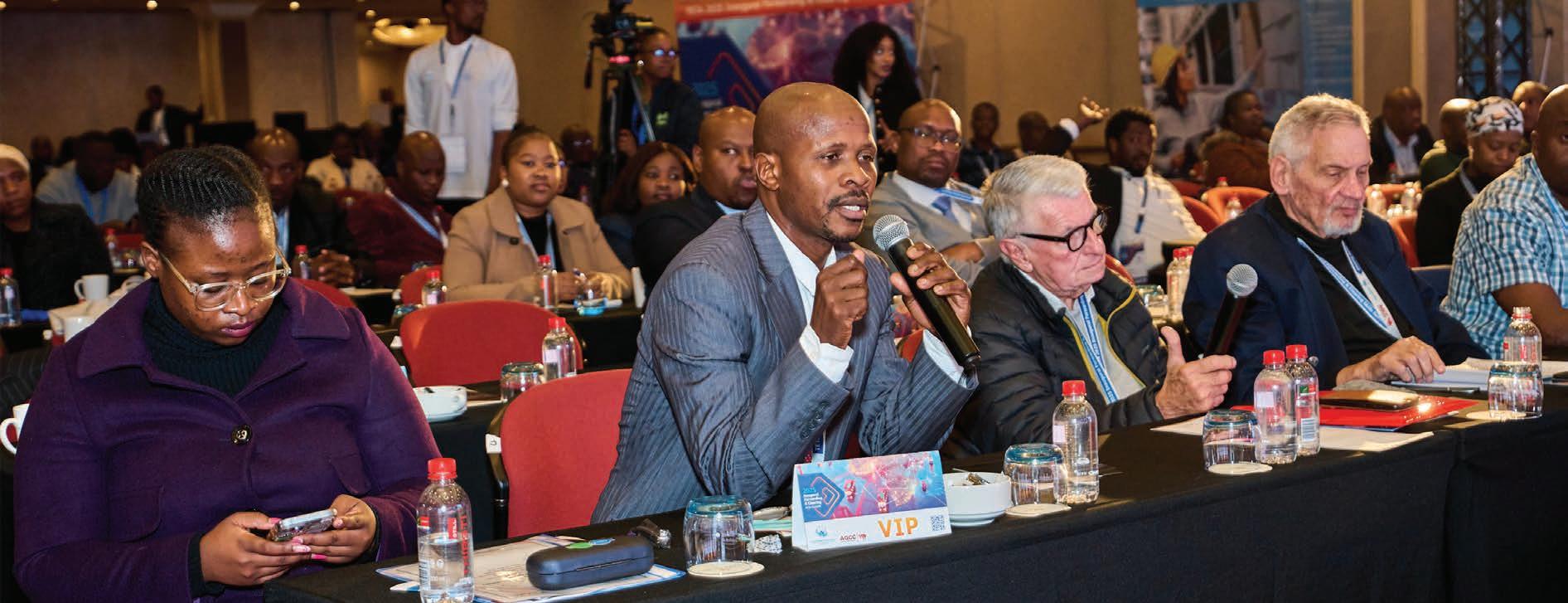
THE TRANSPORT EDUCATION AND TRAINING AUTHORITY hosted the 2025 Inaugural Forwarding and Clearing Skills Summit, which was aimed at enhancing skills, boosting trade and fostering growth across the African continent and globally
The timeless African proverb, “If you want to go fast, go alone. If you want to go far, go together’, reminds us of the power of convening – not just to speak, but also to listen, think together and act in unity toward meaningful change. The power of convening lies not only in gathering people, but also in the shared responsibility to shape solutions that can transform lives, industries and ultimately a nation. It is with this sense of collective duty that the Transport Education Training Authority (TETA) hosted the 2025 Inaugural Forwarding and Clearing Skills Summit, held 4-5 June at the Emperors Palace Convention Centre in Kempton Park, Johannesburg.
Far more than just another event and a “talk-shop”, the summit was a statement of intent: a declaration that the time for passive observation is over and the era of
industry-led transformation, rooted in solidarity, collaboration and commitment, has begun.
A PLATFORM FOR COLLECTIVE THINKING
This summit was organised to be a deliberate and inclusive platform where the transport and logistics industry could re ect deeply, speak candidly and envision the future together.
TETA played a crucial facilitative role, not dominating the conversation, but rather as an attentive listener to the concerns, aspirations and innovative ideas of industry players.
Space for active dialogue and co-creation was created as TETA believes it is only through joint effort that we can shift the skills landscape and bring about long-lasting change. TETA’s commitment is to support, not prescribe, what the industry needs to thrive, compete globally and contribute meaningfully to South Africa’s broader development agenda.
“OUR RESPONSIBILITY AS A SECTOR TRAINING AND EDUCATION AUTHORITY IS TO GALVANISE ALL INDUSTRY PLAYERS TO COME FORWARD AND ARTICULATE THEIR NEEDS. THESE ARE THE SKILLS WE MUST PRIORITISE. THESE ARE THE QUALIFICATIONS THAT WILL POSITION US FOR SUCCESS.” – ADVOCATE ISHMAEL MALALE
The summit brought together logistics and supply chain leaders from across the country and continent, along with government, academia and international partners. The objective was clear: to co-design forward-thinking, sustainable skills development solutions tailored to the unique challenges facing the forwarding and clearing industry.
The key themes focused on:
• Future skills: addressing the transformation needed in the express parcel, shipping and clearing spaces to align with technological advancements.
• Inclusive growth: exploring how to unlock policy and funding support for women, youth, small, medium and micro enterprises (SMMEs) and persons with disabilities.
• Green economy: discussing the role of skills in enabling a just energy transition and building a sustainable logistics sector.
• Funding mechanisms: mobilising resources to power intra-African trade, leveraging the African Continental Free Trade Area.
• Partnerships and policy alignment: strengthening collaboration across public and private sectors to drive industry-led solutions.
With over 90 per cent of South Africa’s international trade facilitated by the forwarding and clearing subsector, the stakes could not be higher.
South Africa’s economic future – and its regional integration ambitions – depend on the resilience, innovation and inclusivity of its logistics sector. However, these ambitions are threatened by persistent challenges: skills shortages, gender inequity, technological disruption and ageing infrastructure.
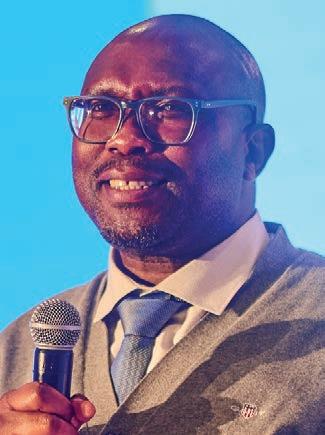
The summit tackled these issues head on. It raised real concerns and clear solutions, particularly around the lack of industry-relevant quali cations, the digital skills gap and the exclusion of SMMEs from training ecosystems.

Kgatile Nkala, TETA’s executive manager for corporate services, articulated the problem with clarity: “These businesses form the backbone of our trade logistics sector, yet many lack access to the training and development resources required to keep pace with global standards. We must ensure that SMMEs and informal operators are not left behind in the skills revolution.”
This call resonated powerfully throughout the summit. Attendees agreed that we cannot build a globally competitive industry without rst investing in its people, especially those historically left out.
TETA’s role was to amplify the voices of industry stakeholders. As company secretary Advocate Ishmael Malale said: “Our responsibility as a sector training and education authority is to galvanise all industry players to come forward and articulate their needs. These are the skills we must prioritise. These are the quali cations that will position us for success.”
Advocate Malale stressed that TETA’s role is to enable, support and invest in the skills revolution the sector so clearly needs. He noted the overwhelming response to the event as an indication of the sector’s
readiness to take ownership of its future.
He further stated: “This is part of a long-term engagement process. After this, we consolidate input and develop a minimum skills programme together with industry associations. We co-create and we act.”
Beyond the summit’s technical outcomes lies a deeper social mission. Every new skill acquired is a door opened. Every empowered SMME is a family fed. Every young person trained is a life altered and a future reimagined.
In supporting this summit and others like it, TETA is playing a pivotal role in addressing South Africa’s triple challenges: poverty, inequality and unemployment. By investing in targeted skills development aligned with industry demand, TETA is not only creating jobs, but also laying the foundation for dignity, mobility and economic participation.
As Nkala noted, the numbers remain troubling: women make up only 19.7 per cent of the workforce in the transport sector. The summit challenged stakeholders to do better –not just because inclusion is morally right, but because it makes good business sense.
“Women bring unique leadership styles and perspectives,” Nkala said. “It’s time to actively support mentorship, skills development, and inclusive hiring practices.”
Several pressing challenges were identi ed during the summit:
• Critical skills mismatches and outdated curricula.
• Hard-to- ll vacancies due to inadequate quali cations.
• Limited participation of companies in levy-based training systems.
• Poor alignment between training providers and industry needs.
• Lack of cybersecurity, data analysis and arti cial intelligence expertise.
• Port congestion and infrastructure inef ciencies affecting competitiveness.
Alongside these challenges came commitments:
• TETA will fund and enable the training programmes the industry de nes.
• Academic institutions will with work TETA to modernise quali cations.
• Industry associations will be involved in ongoing participation and feedback.
• Stakeholders across sectors will ensure inclusion, collaboration and sustained engagement.
One of the most powerful takeaways was this: no single entity can transform the logistics sector alone. Success lies in joining hands across sectors and silos, combining insight with action and walking together toward a shared vision.
TETA is committed to being the bridge, linking government, business, labour and academia in one uni ed effort. The summit has laid the groundwork. Now the task is to translate ideas into outcomes, strategies into systems and conversations into careers, livelihoods and businesses that thrive.
This summit was only the beginning. It was a symbol of possibility and a manifestation of hope that we can build an industry where young people, women, SMMEs and historically marginalised groups can nd space, voice and opportunity.
Let us remember: transformation is not a once-off act. It is a continuous journey. TETA walks this road with industry, not ahead or behind, but alongside it.
TETA remains deeply committed to co-creating a logistics sector that is inclusive, future-ready and globally competitive – one that builds bridges of opportunity, not walls of exclusion.
In convening this summit, TETA af rmed its belief that change is possible when we listen, collaborate and act together. The work ahead will not be easy, but with shared vision and determination, we can build an industry that truly works for all – one that is resilient, inclusive and ready for the world.

For more information: 011 577 7000 info@teta.org.za www.teta.org.za





Green skills are essential for saving the planet, but also providing jobs, writes TREVOR CRIGHTON
Africa has the fastest-growing population on the planet, meaning that the continent’s requirements for development of supporting infrastructure are greater than anywhere else. Ecosystems are under pressure, made worse by natural disasters induced by climate change.
Apart from aiming to meet the United Nations Sustainable Development Goals, Africa’s needs are pressing because the lack of infrastructure makes our people more vulnerable to disasters, climate change and water and food insecurity –and the continent needs more skilled green workers to help solve these challenges.
A joint academic project, Nature-based Solutions for African Resilience, run by Rhodes University, University of Cape Town and partners in Senegal and Europe, is identifying the missing green skills in university degrees and developing nature-based solutions curricula. It does so by strengthening Nature-based Solutions (NbS) knowledge, skills and competencies among students at higher education institutions (HEIs) and professionals involved in the planning and implementation of infrastructure.
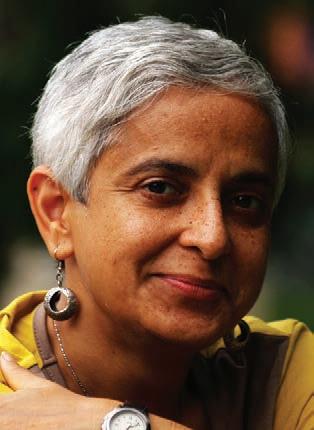
“Rather than focusing narrowly on technical skills, the project emphasises the importance of ethical innovation, stakeholder engagement and co-creation of resilient and sustainable urban environments,” explains Professor Sukhmani Mantel, associate
professor at Rhodes University’s Institute for Water Research. “It also promotes designing and engineering that encompasses ecosystem-based approaches and green infrastructure, preparing future leaders to respond to climate challenges in socially and environmentally responsible ways.”
Professor Mantel explains that the ndings of preliminary needs analysis conducted by experienced HEI-based researchers in South Africa and Senegal reveal a strong and growing demand for NbS education. “In South Africa, while professionals demonstrate a higher level of familiarity and experience with NbS, there is a critical gap in understanding among students and government of cials. Across both countries, there is broad support for incorporating NbS into undergraduate and postgraduate curricula, with a particular emphasis on real-world case studies and practical application”.
“In response to these needs, the project will develop accredited graduate courses in partnership with HEIs. These will be offered as compulsory or elective modules at the honours and masters levels in Environmental Science and Built Environment programmes,” says Kirsty Carden, associate professor and director of UCT’s Future Water Research Institute. “Engagement with industry partners is also underway to accredit several short courses that are being developed for Continuous Professional Development (CPD), ensuring relevance for practitioners already in the eld.”
She says successful implementation will depend on cross-sectoral collaboration, capacity-building and a robust evidence base to
guide scalable interventions. “By bridging the existing skills gap through curriculum reform, vocational training and stronger partnerships between academia and industry, the project will contribute to building the green skills essential for sustainable development, empowering individuals to navigate and manage the complex technical, ecological and social dimensions of NbS, supporting long-term climate resilience and inclusive growth across the continent.”
The Harambee Youth Employment Accelerator partners with service providers to offer a number of projects with a green skills focus, including adding green elements to traditional artisan skills programmes and introduction to green skills in short skills programmes; solar and heat pump specialisation enabling quali ed lumbers to add additional value to their businesses; short skills programmes for assistant solar installers; support for a training providers who have just started a one-year solar PV installer quali cation and participation in development of job classi cations and quali cations for a new quali cation in environmental work.
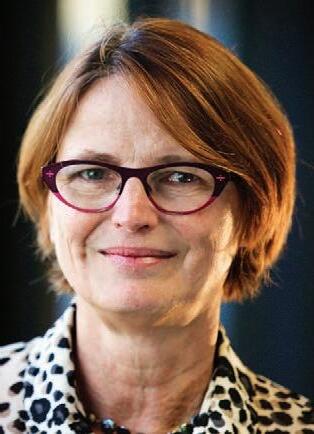
Sherrie Donaldson, lead: emerging opportunities and opportunity development and incubation at Harambee Youth Employment Accelerator, explains that platforms such as SA Youth allow young people to self-select into opportunities, but SMEs can register on the platform and create an opportunity for young people to apply. Additionally, partners such as Nepowrx use all opportunities to source work places for their programmes and would de nitely do this.
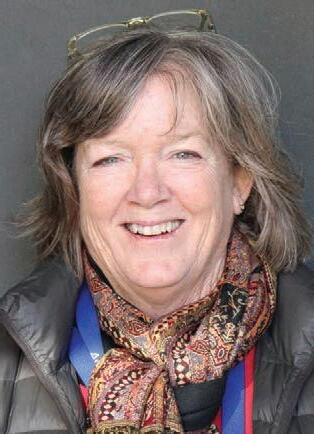
Donaldson says it would be “amazing” if all levels of education could incorporate green thinking into their curriculums, for example, using energy and water wisely to save. “A better basic knowledge would give young people a baseline and make it easier for them to move into green opportunities. Harambee is making our Ready To Work content available for free on a train-the-trainer basis – happy to connect people if they want more information,” she says.
ITUMELENG MOGAKI speaks to experts to understand how peer-to-peer learning is transforming SA’s townships, unlocking real career opportunities and preparing young people for the future of work
In South Africa’s townships, young people are quietly leading a change. Instead of waiting for help from government or big organisations, they are taking action themselves.
With laptops, big dreams and a team spirit, they are teaching each other coding, design and digital skills, and building local learning communities where opportunities have often been limited.
The power of peer-to-peer learning
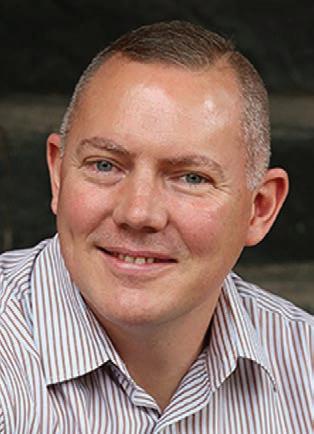
According to Jason Suttie, MD of The Coding Ground (TCG), a nonpro t run by volunteers who train talented township youth to become web developers, any initiative’s effectiveness depends on the quality of knowledge being shared. “Learning certainly happens, but the correctness and real-world application of that learning depends very much on the person sharing and their experience.”
TCG has become a standout example of how peer education, supported by mentorship, can lead to real transformation. Founded in 2017 by locals determined to make a change, TCG blends peer-led learning with structured mentorship to train township youth in web development.
“Many of our graduates have gone on to secure full-time jobs in tech,” says Suttie. “They’re now buying homes, cars and supporting their families, and some are even paying for their siblings’ education. It’s a story of hope.”
graduates from earlier cohorts to return as mentors. “This is where we see the most impact. When students see someone who was once in their position now thriving in the eld, it inspires them.”
But even successful initiatives like TCG face signi cant challenges. For peer educators, the obstacles go beyond simply teaching; it’s also about ensuring access to transport, food, computers, internet and, crucially, pathways to real employment.
“What really makes the difference is when partner companies offer internships and ultimately hire our graduates. That kind of commitment is vital,” says Suttie.
Ethical foundations and responsible AI use
As the digital world evolves, so too must grassroots education models. Professor Johan Steyn, a South African arti cial intelligence (AI) ethics expert, highlights the need to add structure and broaden the skill set beyond coding. “Just because a young person is good at coding doesn’t automatically make them a good teacher,” he warns, calling for more formalised models that ensure quality teaching.
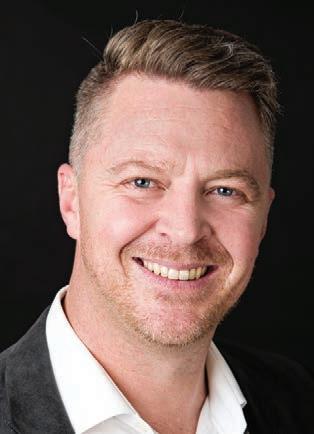
This combination of grassroots passion and formal mentorship appears to be key. TCG leverages the experience of industry professionals who volunteer their time, but also empowers
Professor Steyn also emphasises the urgency of preparing youth for the future of work, saying that with AI systems rapidly taking over many coding tasks, young
“AI won’t replace us, it will change how we work. Repetitive jobs will fade, and roles will evolve to include more emotional intelligence and creativity. Think AI-assisted sales, strategic finance, and data-driven HR. For SA, it’s about adaptability, upskilling through apprenticeships and on-thejob training will matter more than costly degrees.” – Rob Mailich, Global CEO, REDi Holbourne Recruitment Group.
people must learn to prompt and collaborate with AI tools rather than compete with them.
“We need to teach how to think critically about technology. That means workshops on responsible AI use, ethics and understanding misinformation, ideally supported by corporate social investment programmes in libraries or community centres,” says Professor Steyn.
This holistic approach, combining technical skill, ethical grounding and critical thinking, may be what township youth need to remain competitive in a rapidly evolving job market.
Echoing more or less the same sentiment, Suttie says there is a need to align upskilling with what the market actually demands. “We don’t want to just upskill; we want to create skills for what companies need now. Partnering with the private sector is key. Why should a company choose a township graduate over a university one? Because it’s the right thing to do and it works.”
In conclusion, there’s agreement that, with the right mix of mentorship, corporate support and learner accountability, peer-to-peer learning can become a cornerstone of youth empowerment in South Africa.

Follow: Jason Suttie @ www.linkedin.com/in/jason-suttie-312a6464 Johan Steyn @ www.linkedin.com/in/johanosteyn Rob Mailich @ www.linkedin.com/in/robmailich
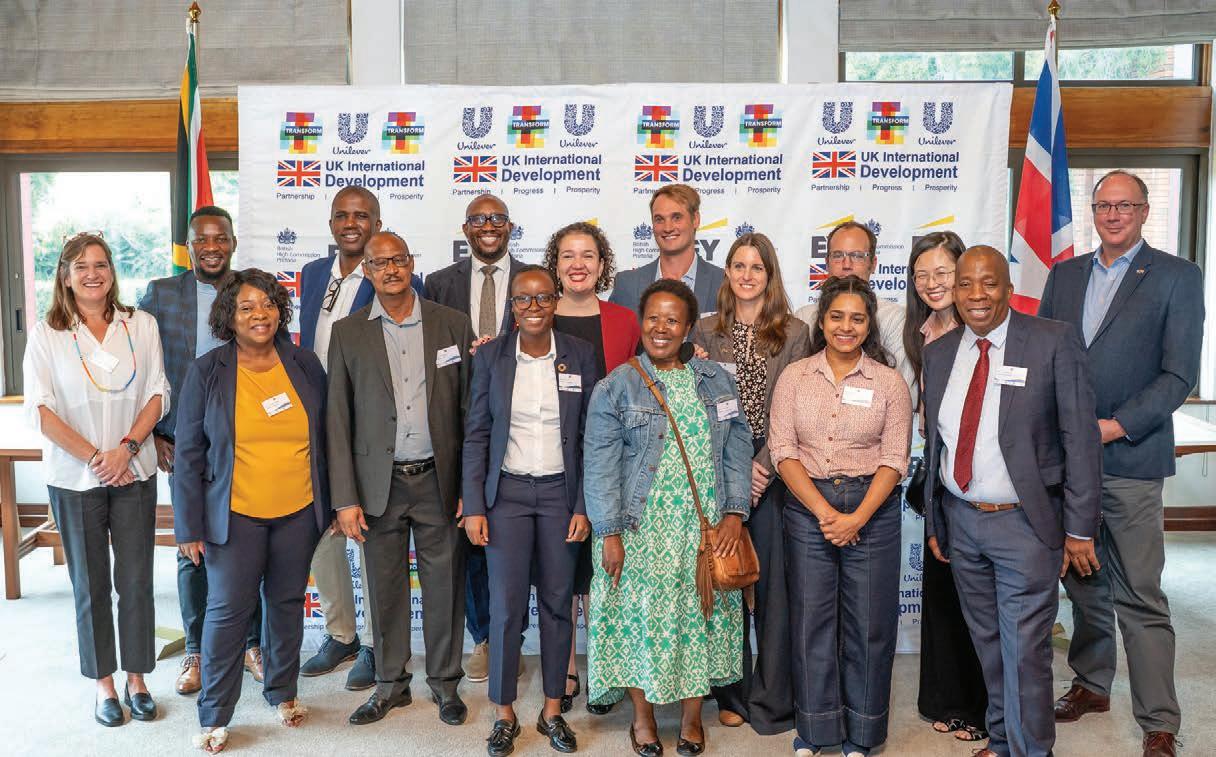
Four innovative South African start-ups tackling plastic waste have received funding to scale up their operations and impact. By UNILEVER SOUTH AFRICA
In a signi cant boost to local innovation, Unilever South Africa, the British High Commission South Africa and EY have announced funding of over R9-million for four pioneering South African start-ups.
This collaborative initiative under the umbrella of the TRANSFORM South Africa programme aims to foster innovative solutions that address environmental challenges and promote socioeconomic development. In addition to funding, the start-ups, selected from more
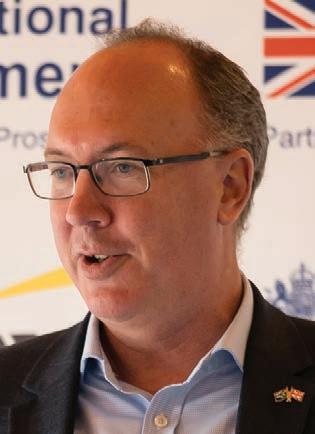
“WE ARE DELIGHTED TO PROVIDE CATALYTIC GRANT FUNDING TO ADVANCE LOCAL INNOVATORS
CIRCULAR MODELS IN SOUTH AFRICA.” – ANTONY PHILLIPSON
than 70 applicants, will receive business support, mentoring, practical experience, resources and networks.
The partnership underscores the importance of collaboration between the private and public sectors in advancing local innovation to drive impactful solutions in plastic waste management and contribute to a circular economy.
The new cohort of South African start-ups will join three others already supported by TRANSFORM, including The Social Factory by Oxfam South Africa, IMAGINEIF and Loowatt. These enterprises have collectively reached millions of people and are part of a wider TRANSFORM global community spanning 17 countries.
“We are proud to support the African Reclaimers Organisation, Sonke, GrooveTech and Smart ll as they improve the livelihoods of local communities and
In South Africa’s bustling cities and quiet suburbs, a quiet revolution is unfolding, led by thousands of informal waste reclaimers. These green champions, often overlooked, are being brought into the spotlight by the African Reclaimers Organisation (ARO), a grassroots movement fighting for their rightful place in the waste economy.
ARO spokesperson and business development manager Luyanda Hlatshwayo says: “Reclaimers are the backbone of South Africa’s recycling industry. They retrieve and sort up to 90 per cent of all recycled materials, such as plastic, glass, metal and electronics, without any formal recognition or support in many cases.”
He adds that the areas the reclaimers collect from often have no organised waste collection services and the reclaimers’ efforts save municipalities nearly R780-million annually in landfill space as well as waste transportation costs. By diverting waste from landfills and waterways, he adds, reclaimers help reduce pollution and environmental degradation, contributing directly to climate resilience and a circular economy.
“One of our biggest battles is changing the public perception that reclaimers are vagrants or criminals. On the contrary, they are skilled workers who provide a crucial environmental service.” He says that reclaimers now receive service fees and have access to better markets, as well as being given training support.
“South Africa can’t meet its recycling goals without reclaimers. We need to recognise, respect, and reward their work,” says Hlatshwayo.
address plastic waste in the region,” says Justin Apsey, General Manager of Unilever Southern Africa.
Antony Phillipson, British High Commissioner to South Africa, says: “We are delighted to provide catalytic grant funding to advance local innovators creating new, circular models in South Africa. It’s especially exciting to support both recycling and re ll models, which move us towards a circular economy.”
Sonke transforms consumer goods consumption for low-income communities through automated refill stations, which dispense a range of products at the best prices. Customers bring their own containers and refill what they need, paying significantly less than they would for pre-packaged goods. This eliminates single-use plastic packaging, one of the biggest contributors to environmental degradation in South Africa.
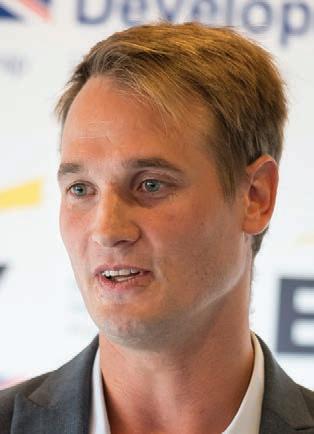
Sonke’s Eben de Jongh, says: “For many families, buying in bulk just isn’t an option. We’ve created a way for people to buy what they need when they need it at the price that works for them.”
He adds that by using internet of things technology, stock is tracked in real-time and automatically restocked, ensuring stations are never left without essential goods.
“We built this model specifically for township and rural environments. Technology gives us an edge, but at its core, this is about dignity and serving those who are most at risk in society. We see the future as green and where the poorest pay the least for the goods they need to survive.
“Plastic pollution is not just an environmental issue, it’s an economic one. Communities are carrying the cost of a system that was never built for them,” he explains. By enabling reuse at scale, Sonke supports a circular economy and helps reduce plastic waste at source.
In a country grappling with plastic waste and ageing infrastructure, Groovetech has emerged as a pioneer, transforming discarded plastic into durable, eco-friendly roads that promise to redefine sustainable construction practices.
Groovetech CEO and founder Linah Maphanga says: “We mix plastic waste into the material used to hold roads together, making it stronger than what’s normally used. This helps build tougher new roads and fix old ones, while also using less new plastic and bitumen.
“Our roads, equipped with superior waterproofing properties, withstand extreme weather conditions, minimising pothole formation and ensuring long-term durability. This approach mitigates environmental degradation and bolsters climate resilience.”
The initiative also supports local waste entrepreneurs as many of its plastic waste suppliers are from local townships and rural
areas in and around Pretoria. Groovetech offers competitive prices for hard-to-recycle plastics, providing a reliable income source for informal waste workers.
“Our higher buying prices incentivise informal waste workers to collect more plastic waste. This not only cleans up communities, but also fosters economic empowerment,” Maphanga explains.
Maphanga is not just focusing on South Africa, her long-term plan is to expand Groovetech’s model nationally and regionally. To this end, Groovetech is already seeking partnerships and distributors across Southern Africa to replicate its success beyond Pretoria, thus underscoring its commitment to scaling impact and supporting waste workers across the continent.
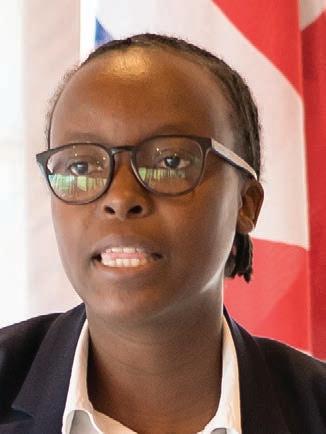
In South Africa’s informal retail sector, Smartfill is improving food affordability and reducing plastic pollution by redefining how essential goods are distributed, sold and consumed in low-income communities, starting with the spaza shop.
Smartfill’s innovation involves smart dispensers installed inside spaza shops, each loaded with hygienically sealed containers offering products, from staple foods to cleaning materials. Consumers can purchase the exact quantity they need, whether a single serving of oats or a few millilitres of shampoo, by refilling their own containers or using paper bags. This bulk-to-retail model makes everyday necessities more affordable for underserved consumers and significantly reduces packaging waste.
Founder and CEO Nevo Hadas says: “Smartfill was inspired by the question: why does a gram of rice cost more in a 500g pack than in a 10kg bag?” This question sparked the mission-driven effort, leading
“WE ARE PROUD TO SUPPORT THE AFRICAN RECLAIMERS ORGANISATION, SONKE, GROOVETECH AND SMARTFILL AS THEY IMPROVE THE LIVELIHOODS OF LOCAL COMMUNITIES AND ADDRESS PLASTIC WASTE IN THE REGION.” – JUSTIN APSEY
to a partnership with Smollan Group, and the creation of a retail system that is economically and environmentally smarter.
“Affordability is the key driver behind consumer adoption. In many spaza stores, we complete hundreds of transactions monthly, with most purchases in quantities smaller than that available on shelves. This flexibility enables consumers to manage their budgets more effectively, often buying just what they need for a meal. For example, oats are regularly sold in four rand and eight rand portions. Even with these small quantities, Smartfill outsells the packaged version on the shelf in volume and value.
“Spaza shop owners benefit from better margins and streamlined stock management. Manufacturers like Unilever, who have partnered with Smartfill in South Africa and Bangladesh, view the system as a viable alternative to the sachet economy and a major contributor to single-use plastic waste and reduction,” Hadas explains.







for support is a good way to increase chances of success. Different initiatives are set up to assist entrepreneurs, including in the artisan space.”
“For example,” he says, “Allan Gray’s Allan Gray Makers – Artisan of Mzansi competition will go a long way to showcase artisans in the country. The prize money is also associated with the competition and can help fund the expansion of the businesses that participate.”
Skilled artisans have the potential to solve South Africa’s unemployment challenge, only if they are brave enough to see themselves as employers, writes
It is well known that South Africa has an unemployment challenge. What is lesser known is that private companies, NGOs and SETAs have decided to take the bull by the horns and assist the artisans, who qualify from skills development centres every year, in shifting their thinking and starting to see themselves more as employers as opposed to employees.
This multistakeholder partnership may be key to job creation and industrial competitiveness in South Africa.

Edzai Zvobwo is the CEO of Acalytica, a South African digital infrastructure platform supporting artisans and entrepreneurs in growing their businesses online. He leads the Artisan to Entrepreneur Programme and works with partners such as Sasol, Allan Gray Makers, and TEDSF to empower skilled workers nationwide. According to Zvobwo, “Turning a trade into a business starts with the basics: registering with the Companies and Intellectual Property Commission, securing tax compliance and applying for funding or start-up kits through organisations like NYDA, SEFA or local development agencies.”
Patrick Molokwane is a researcher at JET Education Services. His organisation works with government and the public sector, civil society organisations, local and international development agencies and educational institutions to improve the quality of education and the overall
BUSANI MOYO
relationship between education, skills development and the world of work. He agrees with Zvobwo and adds: “Efforts to meet the demand for artisans in South Africa are not only the responsibility of the government, but of all stakeholders in the country. NGOs generally focus on skills development programmes, advocacy and awareness, and support services such as career guidance and job placement assistance.”

“REAP is a agship programme of RegencyFN, supporting professional development for artisans in South Africa for economic growth. Trade-Mark is a social enterprise that works with township artisans, connecting them to households that need their services,” says Molokwane.
Zvobwo advises artisans who want to excel, whether in employment or as entrepreneurs, to “think beyond physical tools”. He adds: “They need digital visibility, branding and platforms to attract clients and manage their work.” He believes “artisans who embrace both traditional craftsmanship and modern business tools are far more likely to survive economic downturns and position themselves for long-term success.”
Molokwane has some news for those who want to go the entrepreneur route: “The fact of the matter is that entrepreneurship is not easy.” But he has good news too: “Finding opportunities
One programme helping artisans become entrepreneurs is the R12-million Artisan Entrepreneurship Fund launched by the Chemical Industries Education and Training Authority (CHIETA). The programme aims to train artisans to become job creators rather than simply job seekers. This re ects the realisation that artisans are capable of starting their own enterprises and creating jobs.
The Acalytica Artisan to Entrepreneur Programme helps artisans build a web presence, accept bookings or payments, and market their services professionally – even without technical skills.
Thapelo Nsimbini is an example of how artisans can become entrepreneurs. According to the free South African government newspaper, Vuk’uzenzele, Nsimbini is a bene ciary of a skills programme established in co-ordination between the NYDA and Services Sector Education and Training Authority that helps artisans become entrepreneurs. After qualifying as a tter and turner, she opened a manufacturing and refurbishing business.

ACCESS THE ACALYTICA ARTISAN TO ENTREPRENEUR PROGRAMME
Follow: Edzai Zvobwo @ www.linkedin.com/in/edzai-zvobwo-b6573a33 Patrick Molokwane @ www.linkedin.com/in/patrick-molokwane-a43a4b17a

PARTICIPATE IN THE NYDA AND SERVICES SECTOR EDUCATION AND TRAINING AUTHORITY SKILLS DEVELOPMENT PROGRAMME
Across South Africa, a new wave of digital creators is turning away from one-size-fits-all tech and building hyperlocal solutions shaped by language, logistics and lived experience, writes BRENDON PETERSEN
Young South Africans are creating hyperlocal tech that speaks to real needs in language, access and logistics.
Rather than replicate Silicon Valley’s global- rst approach, a generation of digital creators is building solutions rooted in the communities they know best, where multilingualism is the norm and formal infrastructure is anything but guaranteed.
From its base in Cape Town, Botlhale AI is developing tools that let businesses communicate with customers in South African languages such as isiZulu, Setswana, Xitsonga and Afrikaans. The company’s origin story is personal. Co-founder Thapelo Nthite remembers trying to help his grandmother navigate her cellphone, only to realise that the English-only instructions effectively locked her out of using her own device. That moment exposed a deeper divide between technological promise and real-world access.
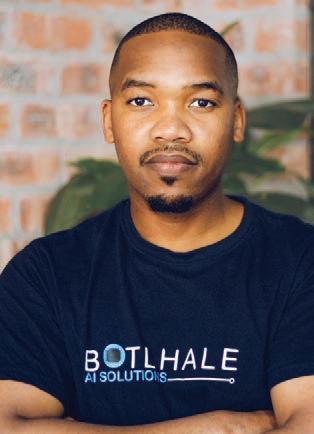
For many South Africans, however, it still is. Botlhale AI’s work is not about surface-level translation. It is about building systems that re ect the lived reality of their users. Their work reminds us that language is infrastructure too, one that can either enable or exclude.
Rentoza, with of ces in Johannesburg and Cape Town, takes a different approach to the same principle. It is a subscription-based e-commerce platform that gives customers access to devices and household essentials without needing traditional credit. From the start, the business was shaped by the complexities of operating in South Africa. These include intermittent connectivity, limited infrastructure and inconsistent physical addresses.
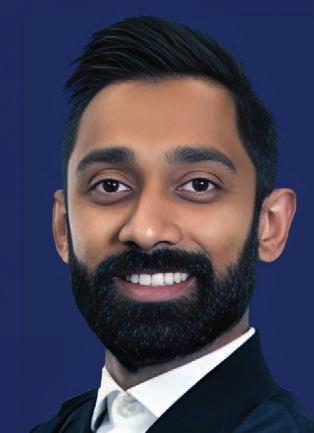
The team’s rst solution was Naledi, a multilingual personal banking assistant. It worked. That success led to the development of BUA, a platform that lets companies build their own AI-powered chatbots in local languages. Later came VELA, a multilingual analytics engine for call centres, capable of interpreting and classifying interactions in South Africa’s many of cial languages. These are not just language tools. They are a rede nition of what customer experience means in a multilingual society, especially for people whose voices are often left out of digital design frameworks.
“Language should not be a barrier for accessing digital services,” says Nthite.
“We don’t assume bre speeds or high-end devices,” says Mishaan Ratan, Rentoza’s CMO, CSO and co-founder. “Our platform is designed for mobile- rst engagement because that’s the reality for most South Africans.” With mobile penetration sitting at over 95 per cent, digital access exists in theory. In practice, it is limited by cost, bandwidth and environment.
Designing for this reality has required a different logic. Interfaces must be light and intuitive. The platform must work well on older phones. The delivery network must nd ways to reach customers even when they cannot
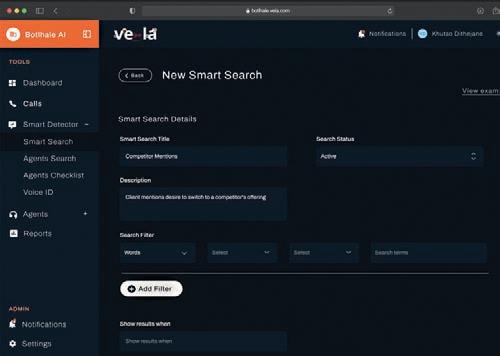
drop a pin on a map. What Rentoza has built is not just a commerce engine. It has become an operational system for navigating spatial and logistical inequalities, bridging the gap between digital intent and physical delivery.
Botlhale AI and Rentoza operate in different sectors but share a common stance. Both design with constraint in mind, not as an obstacle but as context. The result is not stripped-down software or compromise, but something altogether different: products that emerge from a close reading of environment, language and infrastructure.
This orientation is increasingly visible across South Africa’s digital sector. Young developers are building apps that function of ine, tools that speak in vernaculars and platforms that make sense in places where conventional models fall short. It is not that they reject scale or ambition, but rather that they see scale as something that must grow out of local utility, not apart from it.
If hyperlocal tech has a de ning quality, it is attention to place, not just geographically, but also socially and economically. It begins with the question of who is being served, and whether the technology in question recognises the full complexity of that user’s life. In doing so, it offers a quiet but necessary shift in perspective. Innovation here does not seek to imitate global blueprints. It builds from the ground up, on its own terms.
Follow: Thapelo Nthite @ https://www.linkedin.com/in/thapelonthite/ Mishaan Ratan @ www.linkedin.com/in/mishaan-ratan-09510b12

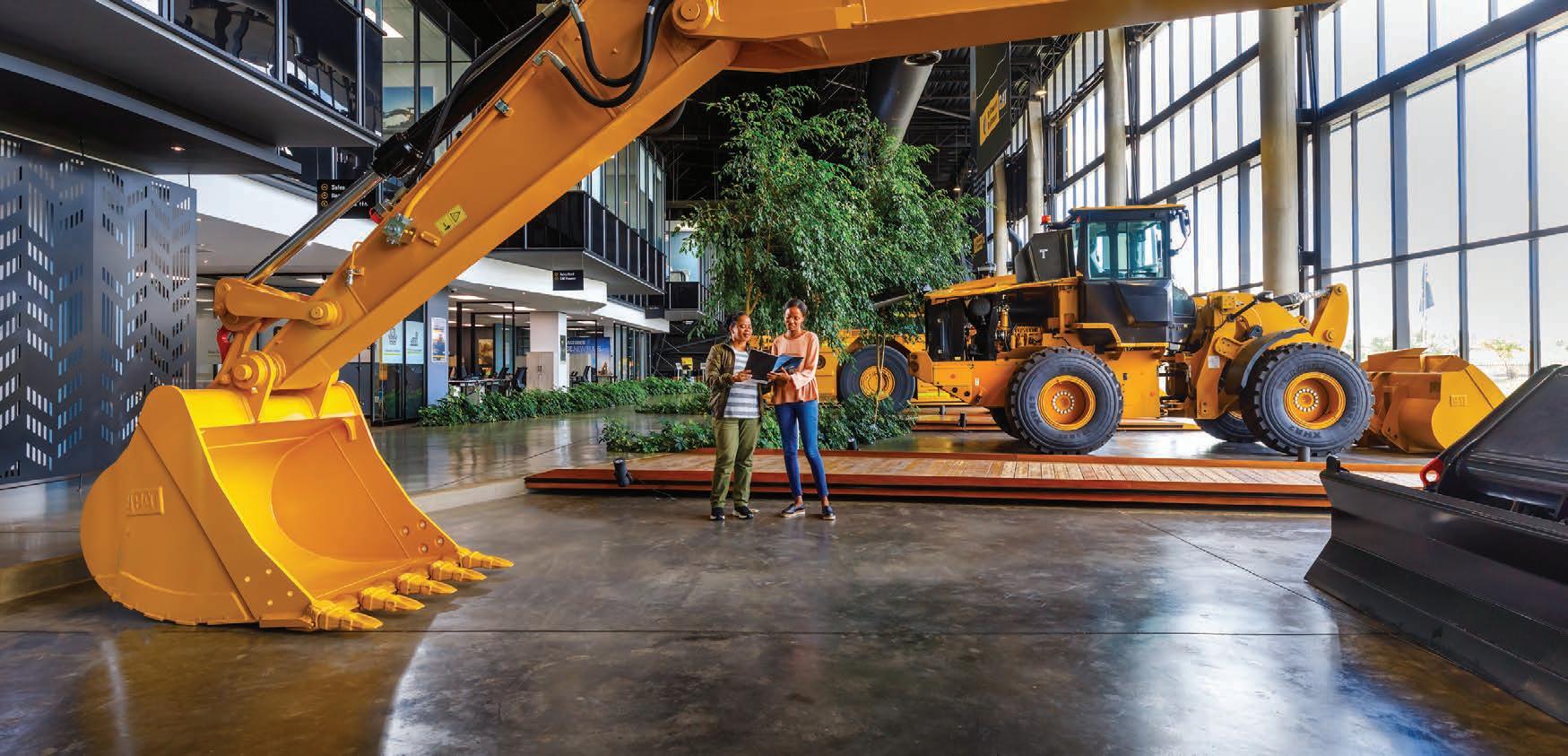




Internships, apprenticeships and innovative training methods at BARLOWORLD are all geared towards ensuring today’s youth are future-ready
South Africa faces a massive and consequential challenge around unemployment in general, and youth unemployment speci cally. In large part, this latter challenge is due to a lack of relevant skills within this base, meaning that the critical youth skills gap must be addressed rst if unemployment in this space is to be reduced.
What is needed are structured internships, apprenticeships and innovative training methods, designed to ensure young South Africans are equipped to succeed in a rapidly changing economy. To this end, Barloworld – at both group and Barloworld Equipment levels – is focused on transforming skills development to ensure future-ready youths.
Speci cally within Barloworld Equipment, the company’s strategic approach to youth

empowerment is anchored in building a sustainable talent pipeline to address South Africa's critical skills gap and skills for the future, while also advancing economic inclusion and transformation.
The core objective is to equip young South Africans with the technical, professional and entrepreneurial skills they need to thrive in a rapidly changing economy, notes Lebo Molokwane, Barloworld Equipment executive head: human capital. This is key in industries, such as mining, construction and heavy equipment, where skilled talent remains in short supply.
“Our apprenticeship programme is designed to develop highly skilled artisans – especially in the heavy earthmoving equipment trade. It is fully accredited through the sector education training authority for manufacturing, engineering and related services (merSETA) and combines theoretical instruction with practical, on-the-job training in our state-of-the-art Learning Academy,” she says.
“What sets us apart is that our apprentices not only gain national technical competence, but also cover CAT OEM-speci c online curricula to close further gaps, as well as workplace readiness through mentorship and exposure to real-world operations.”
Complementing this, she continues, Barloworld’s graduate programme is designed for speci c disciplines, aligned with the organisation's strategic priorities. This programme follows a 10-20-70 per cent learning model. Formal education comprises 10 per cent, while 20 per cent is interactive learning with peers and
“WE VIEW YOUTH DEVELOPMENT NOT AS A COMPLIANCE OBLIGATION, BUT AS A STRATEGIC IMPERATIVE.”
– JUSTINE GABRIEL
mentors, and 70 per cent is experiential learning through hands-on projects. Molokwane adds that graduates rotate across various value chains within the business, gaining broad exposure to become well-rounded professionals.
“Our internship programmes are designed to provide work-integrated learning opportunities focused on unemployed youth who are currently studying. This provides essential practical experience, offers targeted exposure to real-world business environments and helps them develop the skills necessary to transition successfully into the workforce.
“Our approach includes mentorship, performance coaching and personal development plans. These prepare them to either integrate into our business or to contribute meaningfully elsewhere in the industry.”
She suggests that inclusivity and innovation is a key differentiator in the organisation’s strategy. It focuses strongly on increasing the participation of young women in traditionally male-dominated technical roles and continually integrates new learning technologies to make learning easier through a zero-data approach.
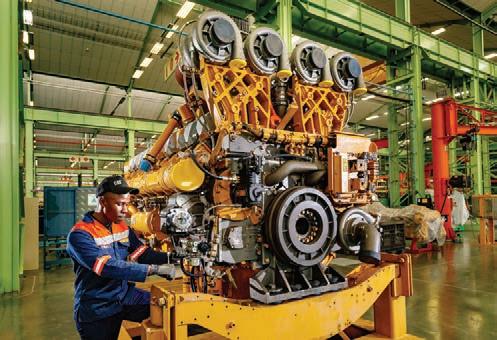
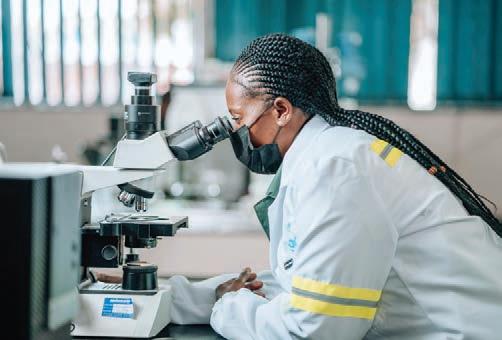
“At Barloworld Equipment, our apprenticeship programme has been enhanced to incorporate digitally enabled learning, including the use of online Caterpillar dealer performance centre programmes, diagnostics using telematics and exposure to advanced machinery with embedded technology.
“Apprentices are trained not only to service and repair equipment, but also to understand the data and systems that drive performance, such as condition monitoring tools and remote eet management platforms. This prepares them for the reality of smart, connected operations in industries like mining and construction.”
Molokwane explains that Barloworld’s internship and graduate programmes also focus on digital literacy, systems thinking and innovation. Interns across disciplines, including engineering, IT, nance and supply chain, engage with real-time business systems such as operating systems, data analytics platforms and customer relationship management tools.
“We also partner with accredited institutions, SETAs and industry bodies to ensure our curricula remain aligned with the fourth industrial revolution and our young professionals are not just equipped for today's jobs, but also those of the future. This includes exposure to green technology, automation trends and sustainability practices, which are central to both our business strategy and global industry shifts,” she continues.
“As industries across the globe continue to digitise and automate, the demand for tech-savvy, agile talent is growing exponentially. For young people, this shift presents both a challenge and a powerful opportunity.”
Barloworld recognises that equipping youths with digital competencies, such as data literacy, automation and remote diagnostics, is no longer optional; it's essential. These skills not only increase their employability, but also empower young people to participate in and drive innovation within their elds.
“At Barloworld, we recognise that addressing South Africa's skills gap requires more than just traditional training. Instead, it demands innovative, adaptable and technology-driven learning solutions that resonate with the realities of a new generation entering the workforce,” says Molokwane.
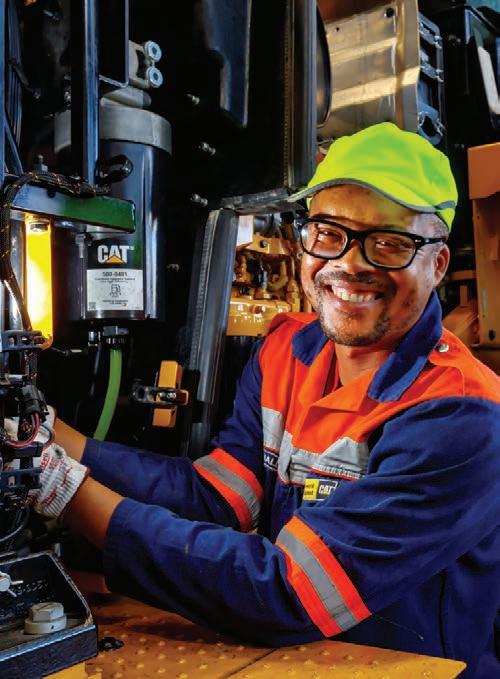
“To this end, we have adopted a blended learning model that combines hands-on practical training with cutting-edge digital platforms. For example, within Barloworld Equipment, apprentices and trainees bene t from simulator-based training, which allows them to safely and accurately learn how to operate and maintain complex heavy earthmoving equipment in a virtual environment before transitioning to live equipment. This not only accelerates learning, but also improves safety and con dence.”
In addition, she notes, the company leverages e-learning platforms and mobile-accessible content to deliver technical theory, soft skills and leadership development and compliance training – all in ways that are exible, interactive and tailored to individual learning paces.
Fortunately, digital skills seem to come naturally to young people, suggests Justine Gabriel, head of human capital at Barloworld. At school and university, many are already exposed to digital skills, which is bene cial when they join corporate, as they are supportive and excited about digital transformation opportunities.
“Our learners are exposed to the Barloworld Business System, which is built on two
pillars – respect for people and continuous improvement. This system trains employees to think about innovation in everyday work situations,” she explains.
“Internships are an important aspect of our focus on the youth, especially in terms of their long-term impact. Our internships typically run for twelve months and during this time, we endeavour to provide valuable work experience that positions the candidates for opportunities in the labour market. We have seen a number of our interns secure employment after their internship programme.”
Gabriel explains that the need is to bridge the gap between what graduates learn at university and being able to hit the ground running when entering the labour market. Barloworld's internships offer an opportunity to bridge this gap.
She adds that Barloworld's investment in young talent is not just about developing talent for the company itself, but also to address a societal problem by providing on-the-job learning opportunities that enable graduates to gain work experience.
“I am the product of an intern programme at Barloworld. I joined Barloworld in 2009, fresh out of university with an industrial psychology degree. I have now been with the organisation for sixteen years and have had the opportunity to move to different business units and occupy different roles.”
She notes that as someone who has gone through the career path – from intern to executive – she can attest to the learning opportunities available to candidates with a willingness to learn and a desire to add value.
“In addition to the structured programmes outlined above, what truly sets Barloworld's youth development strategy apart is our long-term, values-driven vision of empowerment through shared value and inclusive growth.
“Ultimately, at Barloworld, we view youth development not as a compliance obligation, but as a strategic imperative – one that aligns with our purpose of ‘inspiring a world of difference’. For Barloworld, it is about more than merely preparing individuals for jobs; it is about equipping young South Africans to become leaders, innovators and agents of change within their communities and industries,” concludes Gabriel.





For more information: https://barloworld.com/
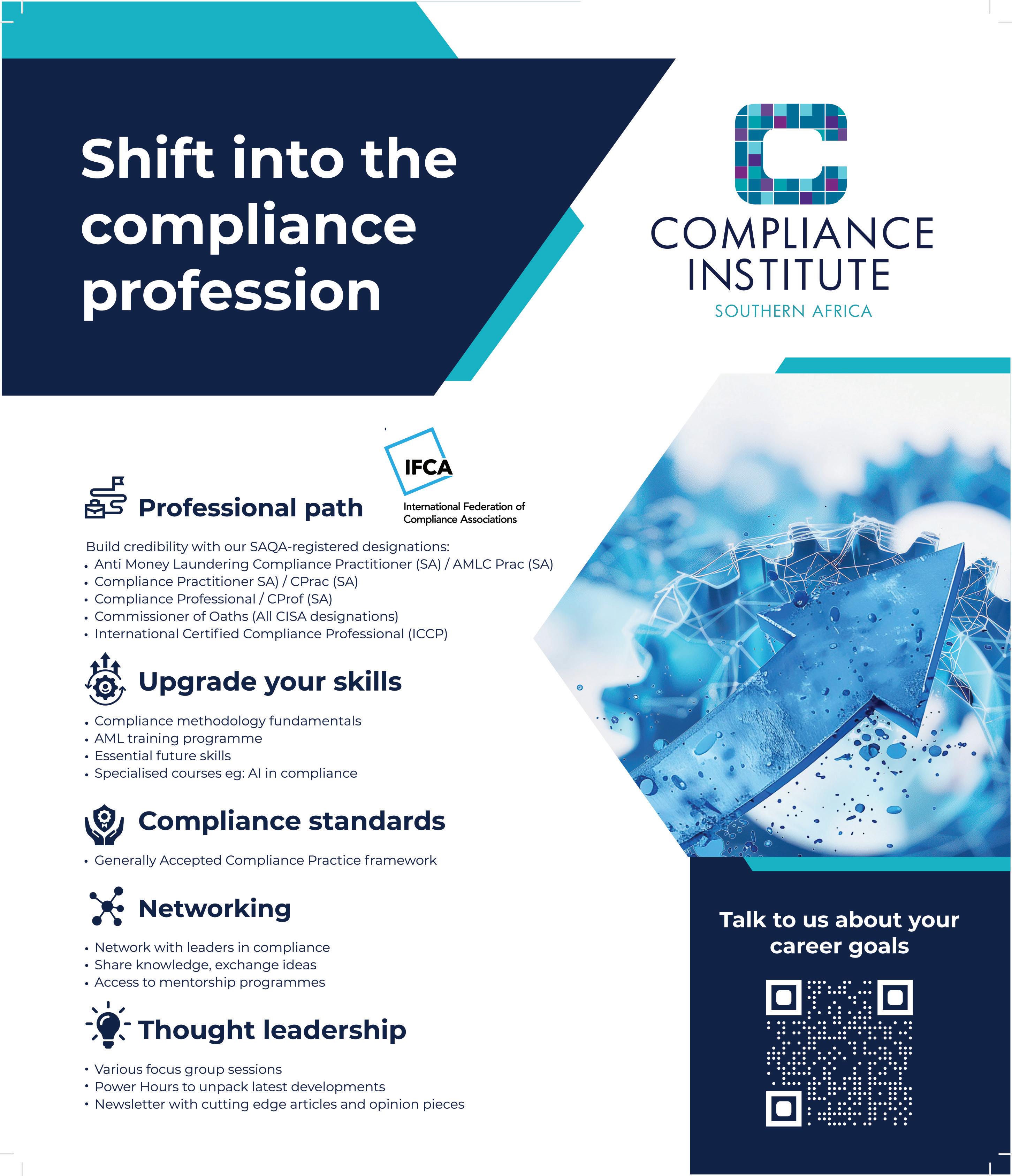
Beyond checklists and codes, true governance begins with values we learn early and apply boldly – at work, in leadership and across society.
By RIANNÉ POTGIETER, CEO at the Compliance Institute Southern Africa
In today’s rapidly evolving world, the importance of compliance, ethics and governance has surged signi cantly. However, compliance, ethics and governance may have become such stylised concepts that they often lose their true meaning. It is worth looking at its origins to “bring it home”.
The human journey of ethics, governance and compliance
Long before policies and regulations enter our vocabulary, we begin learning the essence of governance, ethics and compliance as part of growing up.
• As children, we learn to follow rules (“Don’t hit your sister”), understand consequences (“If you break it, you x it”), and recognise right from wrong. We are taught to share, take turns, tell the truth and clean up our mess. These are foundational lessons in ethical behaviour and personal accountability.
• In the workplace, these same principles show up again, but with higher stakes. “Don’t cheat” becomes anti-corruption training. “Play fair” becomes supply chain due diligence. “Take responsibility” becomes personal liability under legislation like the Companies Act or POPIA. Organisations are simply scaled-up versions of early social systems.
Why it matters
The word is going through global and national shifts. To name a few:
• Increased geopolitical upheavals and changes.
• Technological and robotic advances at unprecedented speed.
• Rising regulatory pressure in AI, ESG, data privacy and anti-corruption.
• South African sectors beyond nance such as public sector, energy, construction and telecoms are increasingly under scrutiny.
• The WEF’s Future of Jobs Report 2025 highlights the global workforce undergoing signi cant transformation, with developments reshaping job demand and skills requirements.
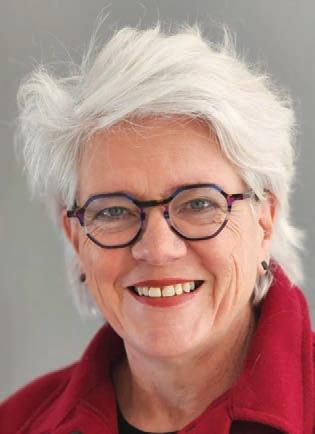
The Institute of Internal Auditors’ three lines model is a handy framework for managing risk and control within an organisation. Each of these lines creates job opportunities, including all operational roles within a business ( rst line), risk management and compliance professionals (second line) and internal auditors (third line).
Organisations are human undertakings operating in an increasingly uncertain, complex, interconnected and volatile world. While our personal moral compass may develop organically, organisations must be deliberate and structured in embedding their values through codes of conduct, internal controls, leadership modelling and training programmes. A company’s culture is not just built on rules, but on the alignment of everyday decisions with values.
The governing body (the board of directors depending on the type of organisation) is responsible for overall oversight of the organisation and ensuring that the three lines model is effectively implemented. Senior management provide strategic direction and support for the three lines model.
The current era calls for agility and creativity. There are highly regarded practices and principles in each of these disciplines, for example, the Compliance Institute SA’s Generally Accepted Compliance Practice framework (GACP) and the Institute of Directors SA’s King IV Report on Corporate
Governance. These provide a solid base to lean on while positioning for the complexity we nd ourselves in.
For individuals:
• Demand for skilled compliance professionals in compliance, ethics and governance is rising.
• Reskilling in compliance, ethics and governance opens cross-sector and global mobility, from banking to NGOs to energy rms.
• Micro-credentials, short courses and designations (for example, the Compliance Institute SA’s compliance and anti-money laundering practitioner/professional designations) are accessible entry points.
For organisations:
• A values-driven compliance culture is a strategic asset, protecting brand trust, investor con dence and operating licences.
• Integrating governance competencies into onboarding and leadership development can help to set the tone from the top and reduce costly missteps.
1. Join the professional body in your chosen eld, for example the Compliance Institute Southern Africa, Institute of Risk Management, The Ethics Institute or the Institute of Directors SA.
2. Take a short course in compliance, data privacy, ESG, governance or ethics.
3. Subscribe to a relevant newsletter.
4. Attend youth days offered by professional bodies.
5. Join a mentorship programme (for example, the Compliance Institute SA has a bi-annual intake in June and November).
Now is the time to reimagine compliance not as red tape – but as a strategic capability that enables innovation, shapes culture and earns long-term legitimacy. For organisations, it is a leadership imperative. For individuals, it is a smart career move.
Follow: Rianné Potgieter: CEO, the Compliance Institute Southern Africa @ www.compliancesa.com
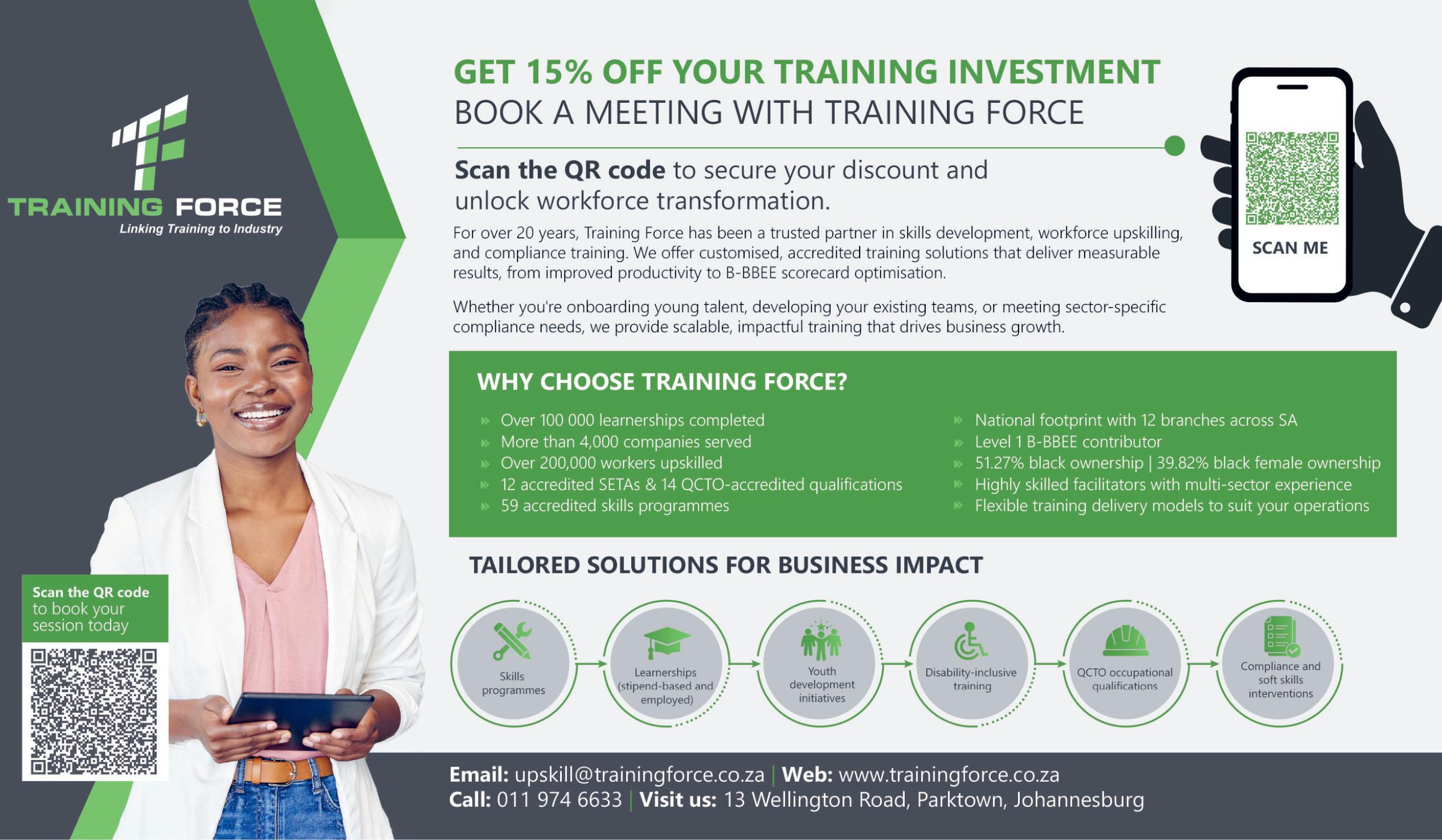

State-owned agency MEGA redefines what it means to invest in people, by LINDI TSHABALALA, senior manager: human capital management at MEGA
In a province grappling with high unemployment and shifting economic demands, the Mpumalanga Economic Growth Agency (MEGA) is tackling the future head-on, not only through investment attraction, but also by developing its most critical asset: people.
Whether inside the organisation or across the province, MEGA is cultivating talent with a clear strategy and long-term vision. Through a combination of internal development, external partnerships and a strong focus on leadership and learning, MEGA is becoming a model of how state-owned entities can drive meaningful human capital growth.

Isaac Mahlangu
study and individual personal development plans. One of MEGA’s proudest success stories is the internal promotion of a senior manager, property development, to an executive role: a clear example of career mobility within the organisation. At MEGA, we don’t just talk about talent development; we live it. We want our people to see MEGA as a place where careers are made.
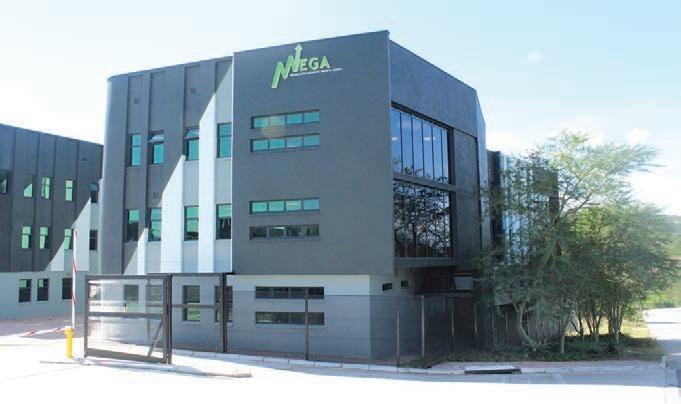
Department of Employment and Labour, with 5 per cent of participants already placed in work.
It’s not just about numbers. It’s about creating real opportunities for people to participate in the economy meaningfully. At a leadership level, the organisation supports high-potential staff through its Executive Leadership Programme for Women, helping close gender gaps in senior roles.
Training needs are also assessed annually. Additionally, the entity combines workshops, certi cations and conferences to support career progression at all levels.
To embed a culture of continuous learning, MEGA is currently rolling out a performance management development system. Engagement is fostered through wellness programmes, regular staff dialogues and a proactive EE committee, which guides inclusive HR development strategies.
MEGA’s approach is to align every talent initiative with its strategic goals. When we invest in people, we invest in sustainable growth.
Internally, MEGA uses a workplace skills plan to identify and address competency gaps in line with organisational goals. A structured talent management strategy maps out how employees grow within the organisation, backed by 100 per cent bursaries for further
“MEGA, in partnership with Phila Jordan Capital, has announced the roll out of a province-wide Practical Artisanal Skills Development Programme to tackle youth unemployment and industrial skills shortages, and support inclusive economic participation. This transformative initiative, backed by the Mpumalanga Provincial Government, aims to equip over 1 500 young people over the next three years with practical and industry-aligned artisanal skills to support key provincial sectors such as mining, energy, manufacturing, agro-processing, construction and tourism,” says the CEO Isaac Mahlangu.
To boost morale, retention and productivity, MEGA pays equal attention to employee wellbeing. Staff have access to a robust employee wellness programme, regular engagement sessions and even a Wellness Club, designed to promote work-life balance and mental health.
To be inclusive, the organisation adheres to a clear employment equity (EE) plan, overseen by an EE committee, which ensures compliance with national legislation and internal transformation goals.
MEGA takes people seriously because you can’t build a capable state without capable people. It is committed to being a place where talent is recognised, developed and retained.
Externally, MEGA is building a pipeline of skilled workers by implementing artisan, learnership and internship programmes. In partnership with local provider FOREK, it has trained 200 artisans in welding, plumbing and electrical work through a R41-million allocation from the National Skills Fund.
Additionally, MEGA has facilitated 15 UIF Labour Activation and Skills Development Programmes in collaboration with the
If we want a capable state, we need capable people – that starts with how we lead, train and care.
As MEGA expands its mandate and programmes, people-centred development is likely to become even more central. With signi cant investments already in place, strategic partnerships secured and internal talent pipelines taking shape, the organisation is positioning itself not only as a development nance institution, but also as a talent engine for Mpumalanga’s future.
The work MEGA is doing today will shape what the province looks like in 10- or 20-years’ time. That’s why it is putting people at the centre because they are the real drivers of inclusive economic growth.
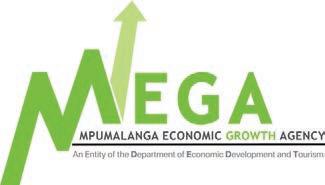
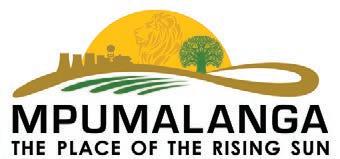
MARCHELLE ABRAHAMS profiles women founders driving impactful change in their chosen industries
“My maternal grandmother stayed in a mud hut with chickens! I don’t know how she slept there with chickens, but she did,” laughs Qawekazi Fadana.
Little did she know that her exposure to livestock would set her on course to become a farmer. The 37 year old is excited about the future and her farm, Mhlelisa Farm, in Haga Haga, about 70km north of East London.
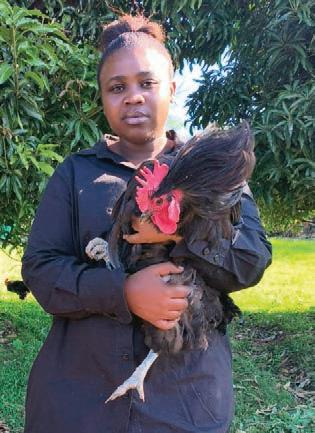
Qawekazi Fadana
Fadana was one of 28 small business owners who enrolled in the rst intake of Stellenbosch Business School’s Small Business Academy in East London. After a few weeks on the programme, she tapped into her business vision. The rest is history.
Turning passion into vision into business
Free-range poultry and stock farming are her specialty, but Fadana loves a challenge and reveals she’s growing litchi trees.
Plans are also afoot to build an on-site abattoir, a project Fadana is eager to get off the ground.
The irony of being an animal lover while livestock farming isn’t lost on her. Fadana has a pet chicken. “His name is Bombom. I do not want to sell him. Everybody wants him, but I refuse.”
the developing world. GPS-enabled tractors, drones and internet of things technology are leading the transformation. Fadana says she once owned a drone but lost it “somewhere”, but her irrigation system is computerised.
Fadana is aware of being the only black woman farmer in her mostly-white community. However, she says she hasn’t encountered much pushback from her male counterparts. “Yes, they do gatekeep quite a bit. It’s almost like a special club that you need to charm your way in,” she smiles, “but the people I have worked with so far, mostly men, have been supportive.”
Fadana and other women like her are breaking gender barriers in patriarchal-led elds. Still, labels meant to empower can sometimes work against women.
Buzz terms like “women in AI”, and “women in STEM” are often thrown around, and for Alexandra Trinder-Smith, this is a double-edged sword. “Part of me thinks, yes, it’s time that people focus on this, but the other part of me is slightly upset that it’s taken this long.”
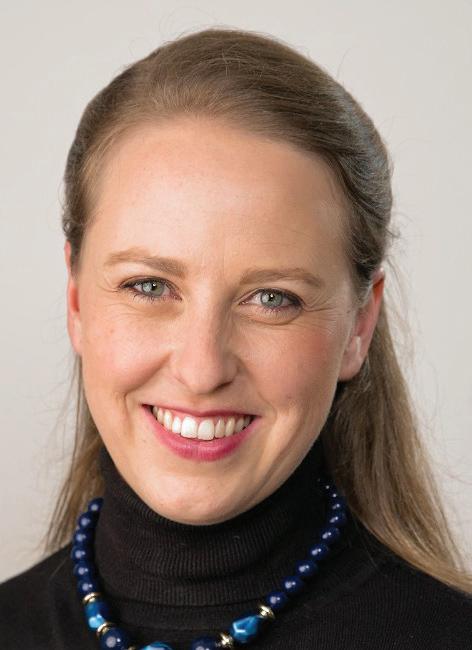
Alexandra Trinder-Smith
Scaling her farm is a priority. As the agritech sector experiences rapid growth, it comes with nancial risks. To date, Africa has the highest number of agritech services in
Trinder-Smith is the executive director of the Siyavula Foundation, a technology-driven NPO that provides free open-learning materials for high school pupils in STEM subjects.
A quali ed maths and science teacher, she cut her teeth at a government school and went on to education consulting. When she rst came across Siyavula’s brochure, it piqued her interest and

Above: Siyavula front page: One of the landing pages for Siyavula.com. Below: Siyavula headstart campaign: HeadStart is one of the campaigns that Siyavula runs at the beginning of the year.
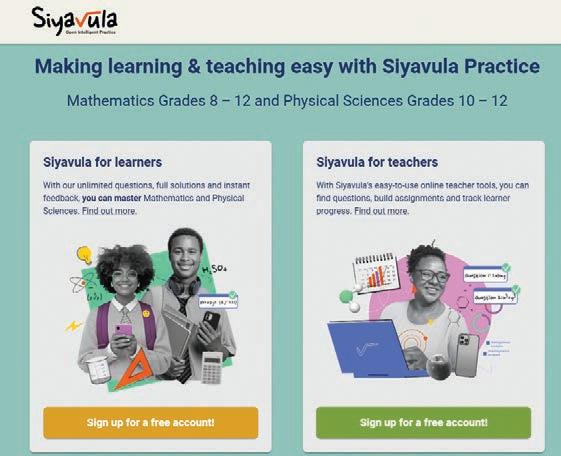
encouraged her to attend a talk by one of the NPO’s founders, Dr Mark Horner.
From part-time fundraiser to edtech leader
Coming out of the pandemic, Siyavula offered her a part-time role heading up the Siyavula Foundation.
Following a company restructure, Trinder-Smith found herself in charge of tech, devs and the edtech unit. Not satis ed with focusing on only one area, she empowered herself with know-how in edtech and AI in education. “I developed my understanding of the tech stack and some of the intricacies under the hood.”
Trinder-Smith is proud of Siyavula’s success stories. She recalls a pupil from Burgersfort, Limpopo, who started using the platform during the pandemic and secured a Wits bursary via one of the platform’s My Teacher partners.
Like Fadana, Trinder-Smith strongly believes in showcasing role models to girls. “You can go far in AI, STEM or tech. Don’t let anybody hold you back.”
Follow: Mhlelisa Farm @ www.facebook.com/people/Mhlelisa-Farm/100068865263352 Siyavula @ www.facebook.com/siyavula siyavula_education www.instagram.com/siyavula_education
MARCHELLE ABRAHAMS highlights South African edtech innovations making learning contextual, inclusive and gamified
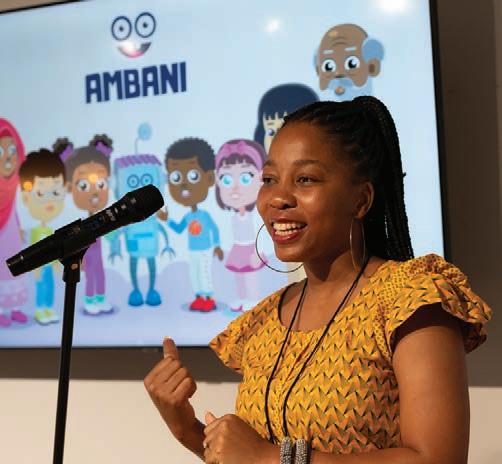
Deeply frustrated by the lack of African-language digital learning resources, local entrepreneur Mukundi Lambani wanted to create a high-quality and accessible platform.
Her vision bore fruit, and Ambani Africa was established. Beyond the didactic need, Lambani wanted to create something that made African children feel seen and that re ected their voices, cultures and stories in a playful, modern way.
“Ambani was also born out of a desire to merge creativity, tech and social impact in one meaningful platform,” says Lambani.
Growing up multilingual in South Africa, she saw rsthand how language shapes identity and access. “My heritage and language roots weren’t often re ected in media or learning tools.
“That gap became personal, and Ambani became a way of reclaiming and celebrating African languages in the spaces that matter most: education, play and storytelling.”
Ambani Africa’s biggest and most successful project is the Ambani Kids multilingual learning app for children aged two and up.
The app has songs, stories and interactive games in English and several South African languages. Lambani explains that it helps children learn key concepts like numeracy, life skills and vocabulary in a fun and engaging way.
“Children can like and save their favourite content, explore animated storybooks featuring
our beloved Ambani characters and enjoy videos and games with familiar faces,” she adds.
The start-up collaborates with educators to align with curriculum goals. It also designs everything with the child in mind. “That means rich visuals, relatable characters and gami ed activities,” Lambani reiterates.
and augmented reality in classroom learning
It’s not only the younger kids who get to have fun. At Regent Business School, Bryson Pather – part of the academic and design team –leads innovation in teaching and learning. This includes integrating cutting-edge technologies like virtual reality and augmented reality into the school’s core curriculum.
“Our MBA programmes and some post-graduate programmes incorporate a simulation in which students can learn certain skills, engage with other students and learn communication skills,” explains Pather.
He cites the Harvard Simulator as an example of how students apply these competencies in real-world scenarios. “You’re automatically grouped with ve classmates, and your collective goal is to reach Mount Everest. Each student has a speci c role to play in achieving that objective.”
The learning model has been well received, especially among visual learners. It offers a fresh, engaging experience that brings learning to life in a dynamic and interactive way.
while maintaining educational integrity and depth,” says Theresa Michael, CEO of Afrika Tikkun Bambanani.
Launched in April 2022, Bamba Learn was created to address the pressing challenges faced by under-resourced communities, particularly the lack of access to quality early childhood development (ECD) programmes and trained educators.
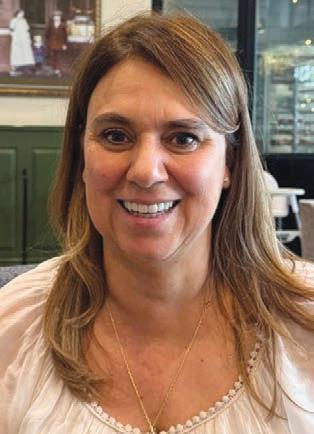
Michael explains: “Beyond the app, ATB’s broader mission includes upskilling ECD practitioners, standardising curricula across the country and integrating health and psychosocial support into early learning.”
Bamba Learn has already made a signi cant impact in South Africa. About 99 per cent of children who used Bamba Learn consistently demonstrated school readiness, with strong foundations in cognitive, emotional and motor development as per formal assessment criteria.
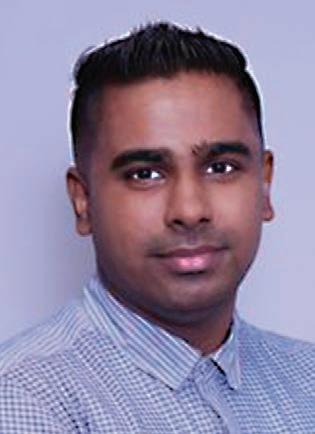
Lambani is as excited about Ambani Africa’s success. She says the start-up conducted pilot studies in classrooms, and in one case, reported a 39 per cent improvement in learner performance after one month of using their app. Both start-ups, Ambani Africa and Bamba Learn, plan to scale locally and globally, a positive sign that edtech is no longer a buzzword but a much-needed tool in the teaching space.
Like Regent Business School, Afrika Tikkun Bambanani (ATB) entered gami cation with its Bamba Learn app. “Gami ed learning in Bamba Learn is purposeful, curriculum-aligned and child-centred – designed to spark joy in learning
The Ambani Kids app is available on the Google Play and Apple App Stores, and includes a seven-day free trial. Bamba Learn is also available on the Google Play and Apple App Stores.
Technology is transforming the lives and livelihoods of all South Africans, including the millions who call our townships home, writes ANTHONY
SHARPE
South Africa’s townships represent a vast pool of untapped economic and innovative potential. Rogerwilco’s 2024 Township Customer Experience Report estimates the collective spending power of township communities at R900-billion, yet many in these communities are fully or partially excluded from the digital economy by virtue of education, language, device or data costs.
Despite this, communication technologies have emerged as a key enabler of commerce in the townships, and now digital tools are reshaping the way people save, send and spend their money. These run the gamut from low-tech cellphone tools to advanced ecommerce and analytics platforms.
Let’s take a look at some enterprises changing the game in our townships.
to take action for social justice by turning every cellphone into a democracy-building tool, allowing individuals – especially black women – to mobilise and co-ordinate. Founded in 2014 by civic activist Koketso Moeti, the platform supports campaigns on various issues, helping communities advocate for change through petitions, SMS, WhatsApp and other digital tools.
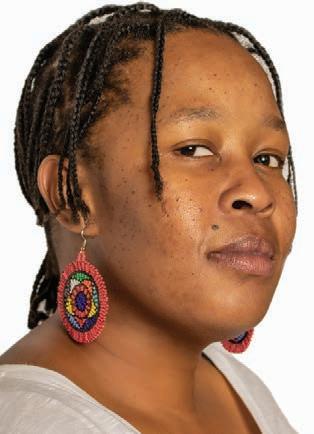
South Africa is not short of cellphones, nor social justice issues. Amandla.mobi empowers people
“We live in one of the world’s most unequal countries, and that inequality is so multidimensional – it seeps into so many aspects of life,” says Moeti. “Despite this, however, people are not apathetic. They organise themselves in various forms in their communities.
“We know that there are so many in South Africa who want to hold the powerful to account, and Amandla. mobi is a platform for bringing communities together in critical moments for targeted, co-ordinated and strategic action to effect change, moving beyond
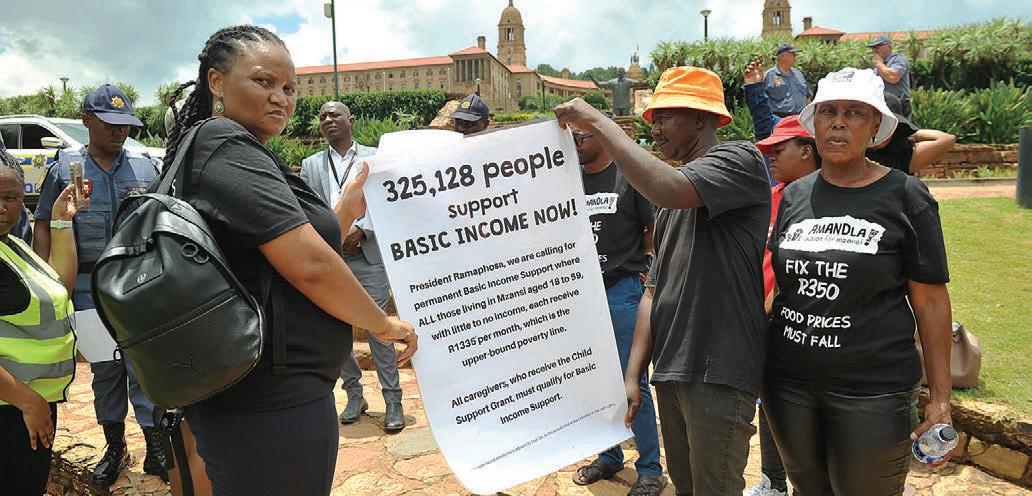

isolated groups to connect with others in ways that have maximum impact.”
Moeti says that despite the many divisions between South Africans, the one thing we almost all have in common is a cellphone. However, when developing Amandla.mobi, it was crucial to take South Africa’s particular circumstances into consideration, developing a solution that anyone could access.
“A big thing for us is that we don’t build tech tools,” says Moeti. “We are about meeting people where they are.” Sometimes, however, the tech through which you engage with people can let you down. “When we launched, people were still on Mxit. When it closed, we lost our ability to communicate with about 12 500 of our members. The lesson for us was to keep looking forward, not just to where people are right now, but where they’re moving to.”
Moeti says, alongside using contemporary platforms such as WhatsApp, Amandla.mobi will always be on SMS. “It’s about ensuring that the digital divide is addressed so people can use different means to connect – Please Call Me, USSD; you name it, we’re there.”
Meeting people where they are also means communicating to them in their home language. “One of the greatest barriers to internet use in South Africa is language,” explains Moeti. “Most online content is in English, which is a minority language in this country. Meeting our multilingual communities has also been a big focus for us.”
For Moeti, investing in their ecosystem is about more than just technology. “One of the things about being a change maker is that you tend to think of yourself as being at the centre

of the world, but we’re challenging systems and powers that have so much more capacity and resources than we do, so in many ways we’re actually on the peripheries.
“Amandla.mobi functions not because our team knows and understands everything, but because we have a membership base we can tap into for collective wisdom. None of us have all the solutions, but there’s so much we can learn and be inspired by – merely by listening to others.”
In 2024, 40 per cent of township residents said they shopped online, a significant increase from 30 per cent in 2023.
Source: Rogerwilco’s 2024 Township Customer Experience Report Social Media
Founded by entrepreneur Talifhani Banks, Spaza Eats is more than just a delivery app; it’s a digital marketplace, a nancial infrastructure provider and a bold new model for township trade. It didn’t start with kota or chicken wings, however, but with cloud computing.
In 2017, Banks and his team launched Analytics X, a consulting rm that helped large companies make sense of their data and migrate to cloud platforms. By 2022, inspired by conversations around the African Continental Free Trade Area, they began thinking simultaneously bigger and more local.
“We wanted to build a platform that could one day power intercontinental trade,” says Banks. “We realised, however, that this was a big project that would require a big budget, so we decided to build a platform that would demonstrate how it could work and then leverage that later.”
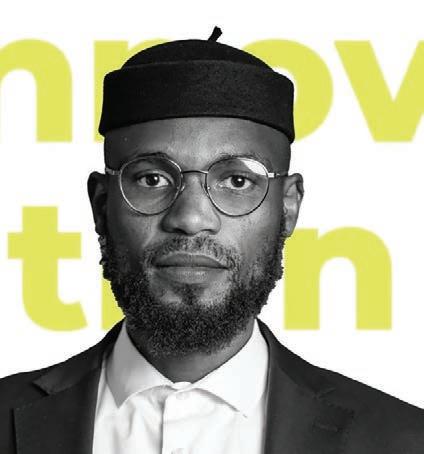
Considering the universal unspoken way of connecting across the continent is food, Banks and co started Spaza Eats with that as its focus. The app began by onboarding township-based
food vendors and small-scale grocery merchants, many of which had never before appeared on a digital platform. “You won’t go to Mr D or Uber Eats and nd Kota King highly visible,” Banks says. “We make those vendors our headliners. That’s our biggest unique selling point: that we include the people mainstream platforms overlook.”
Today, Spaza Eats has more than 4 500 merchants across the country and over 200 000 users. However, with basket sizes typically small, Banks realised that in order to grow, Spaza Eats would need to evolve beyond just food and grocery delivery. Early on, the team realised that their platform’s biggest potential lay in merchant banking. After acquiring a licence to operate as a third-party payment processor, they started to handle
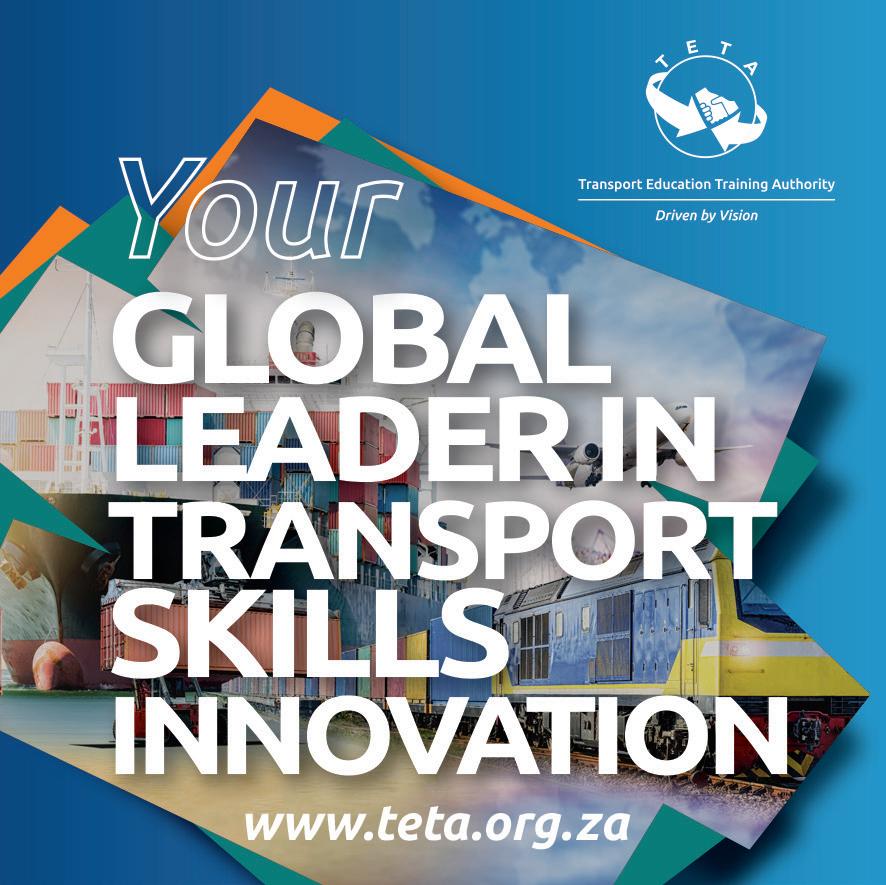
payments through a merchant bank account, and later began offering point-of-sale (POS) devices to vendors.
“We’re like Mr D and Yoco combined,” says Banks. “We’ve learned that a vendor might get one order a day through the app, but they could process dozens more through a point of sale (POS) machine that we’ve supplied.” Spaza Eats is now aiming to distribute 50 000 POS machines nationwide. For Banks, who comes
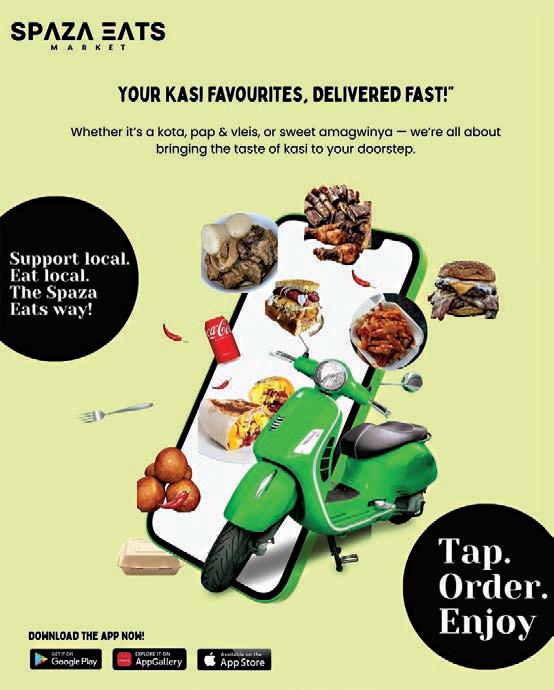
from a data analytics background, the move is strategic, granting Spaza Eats visibility into on- and off-platform transactions and opening the door for future services like loans and other support. In this way, the platform is growing beyond a delivery app into a commerce ecosystem.
That ecosystem, however, comes with challenges. Many vendors don’t have smartphones with high-quality cameras. Others miss orders because they’ve run out of data or aren’t yet digitally uent.
Banks says Spaza Eats is currently in talks with Vodacom and Nashua to improve connectivity for its vendors and build a reverse- billed, low-data version of the app, possibly including WhatsApp ordering in the future.



His advice to other aspiring techpreneurs wishing to make waves in the township economy?















“You need patient capital. It’s an open market, but not an educated one in terms of the technology, so you have to be willing to educate as you sell. Moreover, many corporates face rejection from these markets because they don’t know how to present to them. We had to learn to speak their language.” of don’t
Follow: Koketso Moeti @ https://www.linkedin.com/in/kmoeti1/?originalSubdomain=za Talifhani Banks @ https://www.linkedin.com/in/talifhani-banks-199279ab/?original_referer=https%3A%2F%2Fwww%2Egoogle%2 Ecom%2F&originalSubdomain=ae

With connectivity patchy and education systems overstretched, the real barrier to progress is whether technology can meet people where they are, writes BRENDON PETERSEN
Education technology has never looked more promising. AI-powered tutors, mobile- rst platforms and bite-sized lessons are reshaping how people pick up skills. But here in South Africa, with stubbornly high unemployment and patchy internet access, the real question isn't whether tech can teach: it's whether it can actually reach the people who need it.
For millions across the country, a mobile phone is often the only way online. Seamus Clancy, head of public sector, healthcare and nonpro t sales at LinkedIn EMEA and LATAM, says this reality shapes how LinkedIn builds its learning tools. The company’s work in Colombia during the pandemic offers a useful example. There, LinkedIn teamed up with the government to launch a national mobile- rst learning programme that reached more than 600 000 people, focusing on marginalised communities.
The content was designed to work of ine, optimised for mobile, and offered in multiple languages. This wasn’t some ashy tech breakthrough; it was a smart infrastructure x that met learners where they were.
The lesson for South Africa is clear. LinkedIn Learning now offers of ine
downloads and short modules tailored for low-data users.
But what learners choose to study tells an even bigger story. According to Clancy, many unemployed youth and adults looking to switch careers are going for “just-in-time” learning: practical skills in digital literacy, data science, communication and leadership. These aren’t just courses; they’re signals of a labour market that’s moving faster than traditional education can keep up.
Maureen Lonergan, vice-president of Training and Certi cation at Amazon Web Services (AWS), sees this tension between speed and structure worldwide. In 2024, AWS trained two million people in AI skills through its AI Ready programme. The rising demand isn’t just for technical know-how but also for soft skills like decision-making, coaching and managing change. “With change comes uncertainty,” Lonergan writes, encouraging leaders to create cultures that allow experimentation, failure and critical thinking. Generative AI might speed up
learning but, without psychological safety, it won’t create real competence.
She also highlights AI-powered tutors: smart assistants that can personalise feedback, adapt to each learner’s level and guide them along a tailored path. Research shows one-on-one tutoring improves results, but that kind of attention is rare in underfunded education systems. AI could change that for South African learners who study in short, irregular bursts on their phones.
Still, tech’s potential depends on how it's used. AWS has found success with cohort-based training, where small groups take part in intensive programmes combining technical and soft skills. These sessions don’t just transfer knowledge; they generate ideas, spark redeployment and build momentum. The key isn’t just digitising training but doing it in a way that ts the local context and can be applied immediately. AWS also emphasises integrating generative AI with cloud infrastructure to support scalable, exible learning environments, a critical factor in regions with uctuating connectivity and limited resources.
Measuring impact, though, remains tricky. Lonergan argues the real test is whether training helps teams do things they couldn’t before: launching new products, solving problems or creating services. Completion certi cates mean less than actual capability. And in South Africa, where quali cations don’t always translate into jobs, this distinction matters more than ever.
What LinkedIn and AWS offer isn’t a ready-made solution but a challenge. Access can’t be an afterthought in education design; it’s the foundation. If mobile- rst, AI-powered learning is going to close the gap between potential and opportunity, it can’t assume that scale equals success. Relevance, trust and support still decide who learns, and who gets left behind.
For South African edtech to succeed, it must bridge the divide between learning and earning, focusing not on technological innovation alone but on creating systems that connect skills directly to local economic needs, even when working within connectivity and resource constraints.
Follow: Maureen Lonergan :@ https://www.linkedin.com/in/maureenlonergan/ Seamus Clancy: @ https://www.linkedin.com/in/seamustclancy/
Artificial intelligence programs offer the potential to boost education, while adding to the critical skills the country desperately needs, writes JET EDUCATION SERVICES
JET Education Services (JET), formerly Joint Education Trust, launched more than 30 years ago as a business leader’s vision to create an entity to prioritise education as a means of overcoming some of the legacies of apartheid. Today, JET’s work involves designing, implementing, monitoring and evaluating development programmes. This rigorous process generates valuable research and provides compelling evidence of impact. These learnings intend to inform government policy, enabling the creation of more effective and cost-ef cient future initiatives.
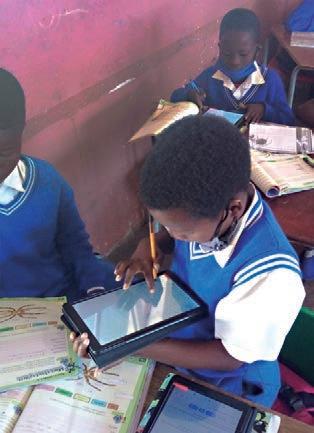
Nathalie Vereen, Chief Operating Of cer (COO) says there is a strong focus on teacher training and early and foundational learning. Essentially, she says, JET focuses on the entire basic education system rather than, for example, only looking at matric outcomes.
JET aims to align school curricula with the demands of the modern workforce, placing strong emphasis on science, technology, engineering and mathematics (STEM), where skilled professionals are in high demand. Many schools, however, face challenges such as overcrowded classrooms and a shortage of quali ed STEM educators.

Recognising the potential of arti cial intelligence (AI), JET introduced school leaders and teachers to new teaching methodologies using AI, machine learning and educational technology. These tools are especially valuable for reaching disadvantaged urban, peri-urban and rural schools.
Craig Gibbs, JET’s executive manager for innovation and
implementation, highlights the importance of equipping teachers with the con dence to integrate AI into their lessons. This empowers learners through adaptive, personalised learning experiences.
The AI maths program, scheduled for one hour weekly, tracks student progress in real-time, helping teachers identify areas for support or enrichment and ensuring every learner receives the attention they need, regardless of class size.
JET has partnered with Eduten, a Finnish organisation operating in over 50 countries, to adapt its AI-powered mathematics program to the South African curriculum. This initiative aims to improve maths education by integrating technology into classrooms, particularly in underprivileged schools. While the AI program includes an of ine component, reliable Wi-Fi and compatible devices are crucial for its success. JET supports schools by providing routers and devices, but emphasises the need for greater government involvement in securing permanent connectivity solutions.
The program adopts a blended learning model, enhancing both teaching and learning experiences. Teachers bene t from AI tools that support lesson planning and offer real-time insights into student performance, allowing them to focus on individual learners’ needs. For students, the program fosters familiarity with technology and improves subject knowledge while preparing them for tech-driven workplaces.
Gibbs highlights the program’s potential to reduce educational inequality. He explains that AI functions as a supplementary “teacher,” ensuring quality learning even in resource-constrained environments. The program’s ability to deliver instant feedback and track progress helps identify learning gaps and guide timely interventions.
“WE BELIEVE AI AND GAMIFICATION WILL BE KEY TO NOT ONLY OVERCOMING THE EDUCATIONAL DIGITAL DIVIDE, BUT ALSO TO INCULCATING AN APPETITE FOR STEM SUBJECTS FROM AN EARLY AGE.” – NATHALIE VEREEN
A pilot study in rural KwaZulu-Natal among Grade 4 learners demonstrated the program’s impact: while students with traditional instruction improved maths knowledge by 3 per cent over a year, those using the AI program showed a 22 per cent improvement. Motivated by these results, JET has expanded the project to a limited number of schools in other provinces, including Gauteng, North West, Northern Cape and Limpopo, where preliminary data suggests similarly positive outcomes. Beyond maths, AI also offers immersive learning opportunities through virtual and augmented reality, particularly in science education. These technologies present cost-effective alternatives to physical labs, providing hands-on scienti c exploration in under-resourced schools and further advancing equitable access to quality education. Vereen emphasises that if South Africa wants to keep up with what is required for the 21st century, we must be aware of the critical skills the modern workplace needs, for example, digital engineering, problem-solving and analytical thinking. “This, in turn, requires far greater uptake of STEM subjects from learners than currently occurs. We believe AI and gami cation will be key to not only overcoming the educational digital divide, but also to inculcating an appetite for STEM subjects from an early age, to bene t all South Africans,” she concludes.
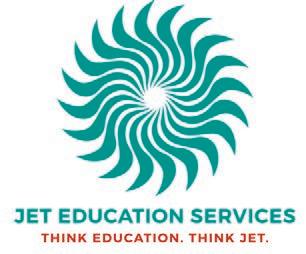
For more information: https://www.jet.org.za/
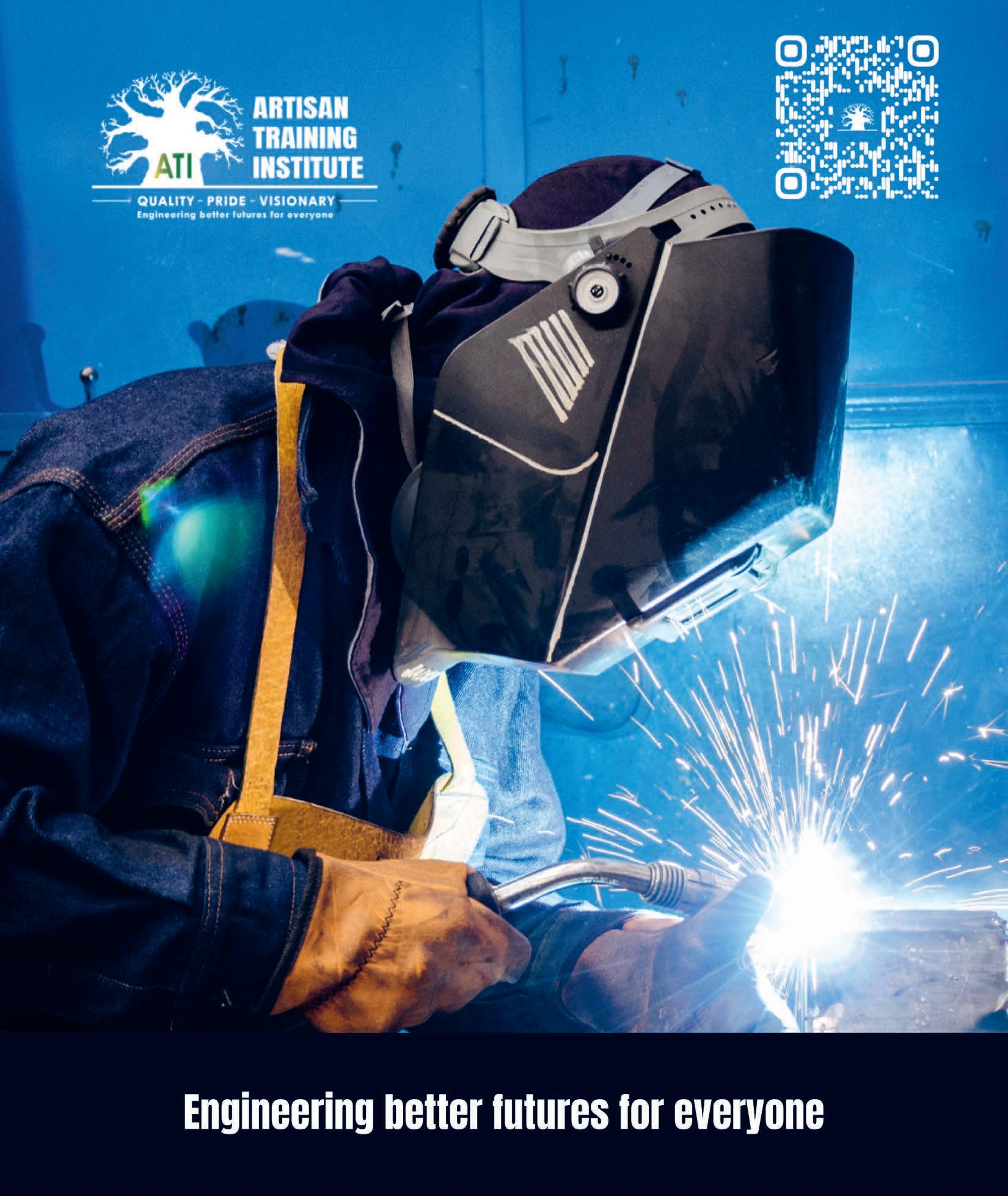
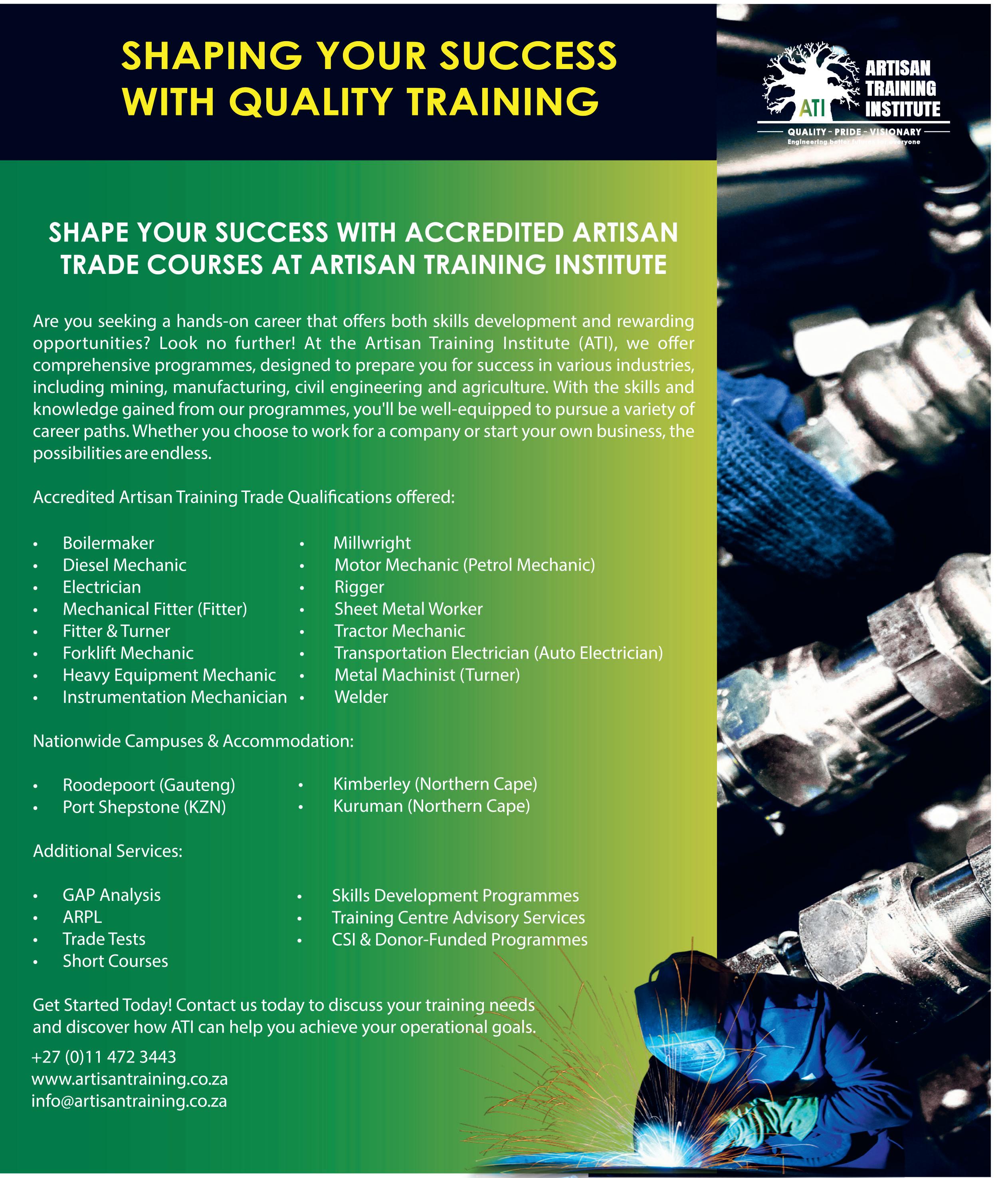
QCTO CEO Outlines How the Council Shapes South Africa’s Skills Development Landscape for the Real World of Work.
QCTO CEO Outlines How the Council Shapes South Africa’s Skills Development Landscape for the Real World of Work.
The Quality Council for Trades and Occupations (QCTO) is at the forefront of reimagining South Africa’s skills development system. By reshaping the future of qualifications, the QCTO ensures that the workforce remains agile, competent, and aligned with the demands of a rapidly changing economy—both locally and globally.
The Quality Council for Trades and Occupations (QCTO) is at the forefront of reimagining South Africa’s skills development system. By reshaping the future of qualifications, the QCTO ensures that the workforce remains agile, competent, and aligned with the demands of a rapidly changing economy—both locally and globally.
“Every qualification that we register is directly linked to the world of work, the Just Energy Transition (JET) and sustainability, with clear outcomes that meet industry standards,” explains Vijayen Naidoo, CEO of the QCTO. “This makes our qualifications not only relevant but essential for building a skilled and capable workforce that can be employed or self-employed.”
“Every qualification that we register is directly linked to the world of work, the Just Energy Transition (JET) and sustainability, with clear outcomes that meet industry standards,” explains Vijayen Naidoo, CEO of the QCTO. “This makes our qualifications not only relevant but essential for building a skilled and capable workforce that can be employed or self-employed.”
Established as one of the three Quality Councils under the National Qualifications Framework (NQF) Act, the QCTO is responsible for developing, accrediting, quality assuring, assessing and certifying occupational qualifications. It oversees the Occupational Qualifications SubFramework (OQSF), working closely with industry bodies, Sector Education and Training Authorities (SETAs) and experts to design qualifications that reflect real workplace needs. The QCTO also enables Recognition of Prior Learning (RPL), providing a structured pathway for individuals with informal or workplace-acquired skills to gain formal recognition.
Established as one of the three Quality Councils under the National Qualifications Framework (NQF) Act, the QCTO is responsible for developing, accrediting, quality assuring, assessing and certifying occupational qualifications. It oversees the Occupational Qualifications SubFramework (OQSF), working closely with industry bodies, Sector Education and Training Authorities (SETAs) and experts to design qualifications that reflect real workplace needs. The QCTO also enables Recognition of Prior Learning (RPL), providing a structured pathway for individuals with informal or workplace-acquired skills to gain formal recognition.

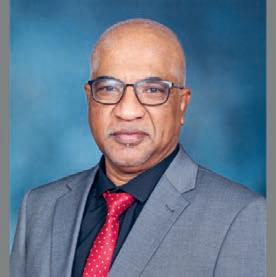
According to Government Gazette No. 50742, issued by the Minister of Higher Education, Science and Innovation, most pre-2009 qualifications officially expired on 30 June 2023. For these qualifications, the last date for learner enrolment was 30 June 2024, and the final date for achievement is 30 June 2027. However, certain pre-2009 qualifications received approval to extend learner enrolment until 30 June 2026, with the last date for achievement set at 30 June 2029. These deadlines are fixed and final.
According to Government Gazette No. 50742, issued by the Minister of Higher Education, Science and Innovation, most pre-2009 qualifications officially expired on 30 June 2023. For these qualifications, the last date for learner enrolment was 30 June 2024, and the final date for achievement is 30 June 2027. However, certain pre-2009 qualifications received approval to extend learner enrolment until 30 2026, with the last date for achievement set at 30 June 2029. These deadlines are fixed and final.
Of the nearly 1,500 pre-2009 qualifications that were active on the NQF, just over 1,100 have been identified for deregistration. These are qualifications that have either already been replaced by occupational equivalents or are no longer fit-forpurpose. The remaining qualifications have been granted time-limited extensions – usually one to two years –to allow industry stakeholders to finalise their replacement qualifications.
months. Meanwhile, 97 NATED qualifications at N4 - N6 level - often offered by public colleges – have received extended enrollment periods pending realignment or replacement.
months. Meanwhile, 97 NATED qualifications at N4 - N6 level - often offered by public colleges – have received extended enrollment periods pending realignment or replacement.
With the June 2029 deadline fast approaching, the QCTO urges institutions, and employers to act now: align enrolments with registered occupational qualifications, apply for accreditation, and ensure you meet External Integrated Summative Assessment (EISA) requirements. The future of training is here—don’t be left behind.
Looking ahead, the QCTO is committed to expanding occupational programmes across all sectors, reaching rural and underserved communities, and strengthening industry partnerships.
““Where there is a legitimate need, we’ve provided a reasonable window for transition,” says Naidoo. “But the direction is clear: all qualifications intended for use in the workplace must eventually align with the OQSF. The future of training in South Africa is occupational.”
Of the nearly 1,500 pre-2009 qualifications that were active on the NQF, just over 1,100 have been identified for deregistration. These are qualifications that have either already been replaced by occupational equivalents or are no longer fit-forpurpose. The remaining qualifications have been granted time-limited extensions – usually one to two years –to allow industry stakeholders to finalise their replacement qualifications.
This approach also extends to trade qualifications. Of the historically registered trades, the majority of which now have registered occupational counterparts. With the remaining trades in advanced stages of development and will be implemented over the next 12 - 18
“Where there is a legitimate need, we’ve provided a reasonable window for transition,” says Naidoo. “But the direction is clear: all qualifications intended for use in the workplace must eventually align with the OQSF. The future of training in South Africa is occupational.”
This approach also extends to trade qualifications. Of the historically registered trades, the majority of which now have registered
With the June 2029 deadline fast approaching, the QCTO urges institutions, and employers to act now: align enrolments with registered occupational qualifications, apply for accreditation, and ensure you meet External Integrated Summative Assessment (EISA) requirements. The future of training is here—don’t be left behind.
Looking ahead, the QCTO is committed to expanding occupational programmes across all sectors, reaching rural and underserved communities, and strengthening industry partnerships.
“Our vision is simple, we want every South African – regardless of age or background – to have the opportunity to gain a credible qualification that leads to work, promotion, or further learning at a higher NQF level. The occupational system allows that.
Our vision is simple, we want every South African – regardless of age or background – to have the opportunity to gain a credible qualification that leads to work, promotion, or further learning at a higher NQF level. The occupational system allows that.




THE NEXT GREAT SOUTH AFRICAN ENERGY EXPERT COULD BE SITTING IN A GRADE 10 CLASSROOM, STILL UNSURE OF WHAT THEY WANT TO DO.




The renewable energy sector is booming, but without young talent, its growth will stall. It’s time to start early, open access and transform skills pipelines.
By VIREN SOOKHUN, MD at Oxyon People Solutions
South Africa’s renewable energy sector is on the rise, fuelled by the global push toward sustainability and energy security.
Yet, even as we invest in infrastructure and green solutions, there’s a major threat to long-term progress: the shortage of young talent. A just transition will require more than solar panels and wind turbines; it demands a deliberate and inclusive approach to building a future-ready workforce.
Right now, the sector leans heavily on professionals from the traditional power sector. These individuals have served the country well but are nearing retirement, and there’s a visible lag in onboarding a new generation. Young people are simply not entering the sector in suf cient numbers. Unless we bridge this gap, our hopes for a self-sustaining, transformed energy future will falter.
One of the biggest hurdles is timing. Too many interventions are aimed at young adults who’ve already left high school when subject choices and career decisions are already made. We need to start much earlier. Conversations about energy careers should begin as early as Grade 9 or 10 when
students start selecting subjects that could shape their futures.
This early exposure should be supported by curricula that introduce core concepts in renewable energy, not just for future engineers, but also for project managers, data analysts, electricians and technicians – many of whom play vital roles in the industry. South Africa’s TVET colleges, in particular, are well-positioned to offer industry-aligned programmes tailored to renewable energy. Their involvement can ensure youth have the right quali cations at the right time.
Building a sustainable talent pipeline requires more than classroom learning. Industry must step up with internships, apprenticeships, bursaries and hands-on training opportunities that expose young people to the realities of energy work. Career days, company open days and structured mentorship can bring the sector to life in the minds of young people.
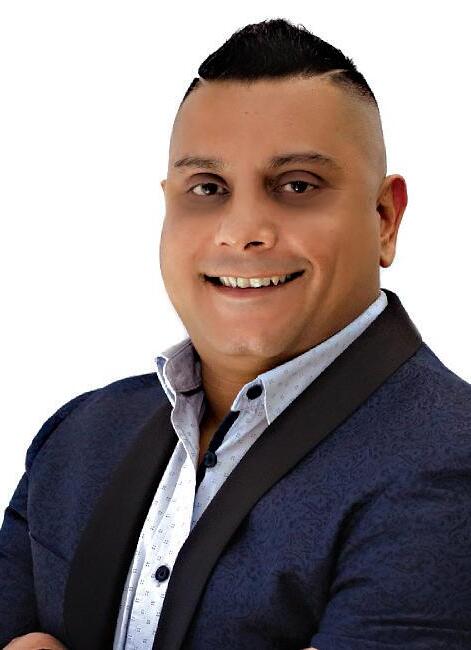
It’s also about visibility. The renewable energy sector is often invisible to learners in rural or underserved communities. Strategic partnerships between schools, colleges, government
and private energy rms can ensure more equitable access to knowledge, career pathways and inspiration.
A major issue is many young South Africans simply don’t know the full range of careers available in the energy space. Without that awareness, they can’t aspire or prepare for them. Sector stakeholders, including industry leaders, must work together to create clearer, more accessible roadmaps into energy careers. One practical solution is opening up high-level industry events to students. These conferences often spark innovation and connect stakeholders, but students are priced out and left on the sidelines. By offering free or subsidised access for those in technical or engineering programmes, we could expose them to real-world discussions, role models and the momentum of the industry.
Being in the room, networking with professionals, listening to debates and understanding emerging trends can be transformative. It brings relevance and motivation to academic work and sets a tangible career target for learners.
The energy sector must move away from seeing youth development as a corporate social investment tick-box to treating it as a strategic necessity. A resilient, inclusive energy industry depends on it. That means intentional investment, not just in bursaries or sponsorships, but also in co-creating a system that connects learners to careers and drives transformation from the ground up.
It’s time to see skills development not as a pipeline problem, but as an opportunity to empower the next generation. Creating jobs, building capacity and addressing unemployment in one of the most future-focused sectors of our economy.
The next great South African energy expert could be sitting in a Grade 10 classroom, still unsure of what they want to do. Our job, across industry, education and government, is to ensure they see a place for themselves in the future of energy.

As climate impacts intensify, South Africa’s crumbling infrastructure reveals a deeper crisis: a skills gap that undermines resilience, sustainability and long-term service delivery, writes LESEGO GAEGANE, senior project manager at the Water Research Commission
South Africa’s infrastructure is failing, not only because of budget shortfalls or ageing materials, but because the skills needed to maintain and adapt it haven’t evolved. Drainage systems can’t handle new rainfall patterns. Dams lose capacity to sedimentation. Roads and bridges collapse within years. We need infrastructure that can adapt and mitigate the impact of climate change. Our current systems are not equipped to do that. Engineers, artisans and planners are trained on outdated models. Their education often doesn’t match on-the-ground realities, which are increasingly shaped by climate variability and environmental degradation. They need to be reskilled and upskilled to incorporate climate resilience in their work.

IT’S NOT A POLICY PROBLEM; IT’S A PRACTICAL SKILLS CRISIS
Much of the infrastructure failure is linked to poor planning for longevity. When we build infrastructure, not enough thought is given to what happens afterwards. That’s why we see new builds falling apart in ve years because there’s no proper plan to maintain them.
The solution lies not in more policies, but in embedding skills development into every stage of infrastructure delivery. If you’re building a dam or a power plant, young engineers must be part of the process. There must be a skills transfer. You can’t just build and walk away. Failure to do so leads to high maintenance costs, service disruptions and reputational damage – outcomes South Africa can no longer afford.
OCCUPATIONAL TRAINING MUST REFLECT SECTOR NEEDS
Infrastructure sustainability demands training that is tailored to speci c subsectors. We need occupational training that ts the work. Generalist quali cations alone aren’t suf cient. A targeted approach is needed – one that ensures workers have the hands-on expertise to address both construction and long-term maintenance, especially under climate stress conditions.
Water and energy infrastructure are intrinsically connected. Water is essential for cooling and power generation, while energy is needed at every stage of the water cycle, from abstraction to treatment. This interdependence requires cross-sector competencies.
Skills such as energy auditing in water utilities and tracking water footprints in energy production must become standard practice. Embedding these capabilities into engineering, planning and operational curricula is vital.
INFRASTRUCTURE SUSTAINABILITY DEMANDS TRAINING THAT IS TAILORED TO SPECIFIC SUBSECTORS. WE NEED OCCUPATIONAL TRAINING THAT FITS THE WORK.
Building skills at this intersection is not a nice-to-have; it’s an urgent requirement.
TVET colleges and community-based training programmes are central to plugging the gap. Skills development is what stands between us and collapse. You can’t have infrastructure without skills. And, you can’t have resilience without both. Developments must be planned in tandem with training requirements integrated directly into infrastructure contracts while driving and championing local innovations. TVET colleges must be central to this effort, recognising that Africa’s infrastructure future relies not solely on the expertise of engineers and scientists, but also on the competence of technicians and artisans.
The Water Research Commission’s projects modelled on these principles have proven to be a success. Among these is the Giyani Local Climate Resilience Programme. By deploying solar-powered boreholes in the region, we simultaneously invested in
training local communities in the management of both water and energy infrastructure. This dual-skilling approach has demonstrably improved operational reliability, reduced costs and generated sustainable employment opportunities at the local level.
At the Water Research Commission (WRC), we’ve created the National Siltation Management Programme (NatSilt), which has launched South Africa’s rst occupationalbased training focused on dam siltation, ecological restoration and catchment rehabilitation. These courses include recognition of prior learning for experienced workers without formal quali cations and are accredited by the Quality Council for Trades and Occupations. The WRC has also partnered with the University of Johannesburg to deliver short learning programmes to upskill workers across the sector.
Africa’s infrastructure must be built on African solutions. We must champion local innovation,

recognising that African solutions, rooted in local knowledge, will yield the most resilient outcomes.
If we look at the Giyani Local Climate Resilience Programme as a successful model, we can clearly see more reliable service, lower costs and sustainable employment for local communities.
At the DEVAC Infrastructure Summit in Johannesburg, regional leaders echoed these views. KwaZulu-Natal member of the executive committee for public works and infrastructure Martin Meyer emphasised the regional stakes: “If KwaZulu-Natal ports fail, South Africa and Africa fail.”
The Deputy Minister of Electricity and Energy, Samantha Graham-Mare, called for policy reforms that put localisation at the centre. Namibia’s Minister of Works and Transport, Veikko Nekundi, pushed for deeper cross-border collaboration.
I believe our collective challenge and profound opportunity is to transform Africa’s infrastructure pipeline into a platform for skills, innovation and inclusivity. Women, youth and rural communities must be placed at the heart of this transformation.

